#and perhaps for the sake of the Ottoman state
Text
Fyodor Lukyanov: Could Iran and Israel drift into a full-scale war?
New Post has been published on https://sa7ab.info/2024/08/16/fyodor-lukyanov-could-iran-and-israel-drift-into-a-full-scale-war/
Fyodor Lukyanov: Could Iran and Israel drift into a full-scale war?


The two rivals’ jabs at each other are rapidly increasing in both number and intensity
The situation in the Middle East, where the aspirations of Iran and Israel have once again collided, is paradoxical in that there is no way out. Both sides would like to put a stop to the other’s gallop, but this is impossible without disastrous consequences for themselves. There are many reasons for this situation, including the geographical compactness of the region, where any action echoes loudly and boomerangs erratically. More importantly, all the problems and relationships are so intertwined that to untangle them would require a colossal effort that no one is capable of. Theoretically, the cord could be cut with a powerful game-changing blow, but nobody has the wherewithal.
This last statement may seem a bit controversial. Israel is pursuing an extremely aggressive policy of reshaping its entire security landscape, hoping to contain the surrounding threats for a long time to come. Iran, on the other hand, is generally seen as an actively revisionist power, managing the regional landscape sometimes directly, but especially through the use of partner groups (a sort of ‘Axis of Resistance’) in various countries. The assumption that a decisive battle is likely should be supported by the fact that the entire region is already in turmoil and external powers, including the traditionally dominant US, are merely feigning active involvement rather than knowing exactly what they want. Thus, it’s surely high time for the plucky and the determined to make the leap to a new status. But what new status?
Historically, there have been successive dominant powers in this part of the world, mostly colonial masters from the West over the past few centuries. Now, for various reasons (mostly their own internal), these powers have withdrawn, perhaps permanently. This is the time for local players to assert their right to dominance, especially since some of them have the relevant traditions (Iran, Turkey), others have the military potential (Israel), and another has a lot of money and control over important religious shrines (Saudi Arabia).
In earlier times, the struggle for influence would have been fierce, and of course there is still competition today. Iran, in particular, is widely suspected of trying to dominate the entire Middle East with its religious and political influence (through Shia communities and friendly political organizations). Turkey periodically juggles with the notion of ‘neo-Ottomanism’, though it carefully avoids it. But the idea of controlling security zones beyond its own borders has been implemented for decades.
Read more
Here’s why there won’t be a world war over the Middle East
However, the various forms of expansion have long since ceased to be about conquering space for the sake of territorial expansion. The aim is the same: to secure a more favorable situation in terms of strategic depth, i.e. the ability to protect itself more reliably from external threats and thereby strengthen domestic security.
This is a widespread phenomenon. Some countries are blessed because they have no troublesome neighbors (Australia or the North American states come to mind, although in the latter case the US can point to Mexico and migration.) But these are very rare exceptions; in most cases such problems have to be faced. Enlargement of borders used to be the norm, now it is the exception – it is unstable (because it is impossible to legitimize) and costly. Buffer zones are more common and we see them all the time. But this method is obviously situational.
Finally, there is the option of influencing the internal affairs of a neighbor to deter it from acting unilaterally. This is probably the most common form of deterrence today. More precisely, it’s desirable because it does not involve major hostilities and the risks associated with them. It doesn’t always work, however.
Coming back to the Iran-Israel axis, both sides are aware of the impossibility of achieving their desired goals through a full-on direct clash. Hence, the constant brinkmanship, including extremely provocative steps, in the expectation that the response will not cross any red line. This has worked so far, although the density and intensity of the mutual jabs is rapidly increasing. In such a format of interaction, it is impossible to leave anything without a reaction, and sooner or later it may turn out that the relatively restrained forms of response have come to an end.
Another problem is the ability of adversaries to anticipate the immediate consequences of their moves. It is believed that the Middle East is home to grandmasters in this field, masters of this high stakes game. But global experience shows that the level of geopolitical mastery is generally declining, perhaps because of dramatically changing contingencies. There is no reason to believe that the various actors are still capable of playing games of real strategic depth, while managing to avoid falling into a shallow tactical pool.
This article was first published by Rossiyskaya Gazeta newspaper, translated and edited by the RT team
0 notes
Text
Watching MYK episode 54 (S2E24), another surprise by TIMS. Madam Margaret (prenses Farya’s nanny) now converted to muslim, it’s funny that she cared to convert whereas her prenses never bothered to convert and change her name at all (LOL). On top of that, she is renamed as Melek now, welcome Melek kalfa.

BUT WAIT!!! Does this mean that Meleki hatun got replaced by her, remember this girl from season 1?:

And her grown up version:

The girl named Meleki, she was a little girl saved by Kösem sultan when her mother died by illness and later she saved Kösem back by hiding her during Safiye’s coup d’etat, since then she became Kösem’s loyal servant until she had been sent away from the palace (iirc because Kösem thought that she was incompetent) in episode 38 (S2E8). You know, this Meleki hatun was famous enough as Kösem’s loyal servant who betrayed her in the end by exploiting Kösem’s plan to Turhan Hatice that she would replace Mehmed by another grandson, removing Turhan Hatice as Valide Sultan with another sultana who could easily be controlled, leading to Kösem’s death by murder.
I mean, will this girl Meleki hatun back and continue her role? Or will she be magically gone and replaced by the old Melek kalfa?? If so, what is the reason?
Could it be the last woman played as Meleki hatun has left the show for specific reason and madam has to replace her? With the similar situation that have happened before in Mahfiruz’s role. Remember this Mahfiruz hatun who got infected by smallpox and died:


And later came Rasha hatun who became Mahfiruze Hatice Sultan:

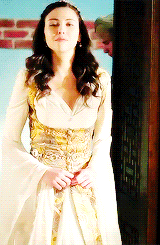
Or could it be another favoritism for Farya since her fans demand that her death by Kösem to be avenged? Will Kösem die by Turhan with Melek kalfa’s help? If so, I wonder why this favoritism has not ended yet even when the actress has stopped playing in this show and is currently busy shooting for her next drama?
I wish this is not the case, I hope Melek kalfa is a separated and different individual and the previous Meleki hatun will come back soon. Because I don’t want another favoritism for Farya when it only caused the disruption and confusion to the story that has been built and established before.
I think it’s enough for Farya became Murad’s legal wife without converting and changing her name, became a sultana without having a sehzade first in Episode 40 (S2E10), ditching the fact that Ayşe Haseki Sultan was the most beloved and held the highest position as Murad IV’s consort, twisted Ayşe Haseki Sultan’s role as Mahidevran 2.0 and died as traitor in Murad’s eyes. It’s enough for Farya had dramatic miscarriage in episode 39 (S2E9) only to have miracle twins sehzade in episode 52 (S2E22). Please, don’t force the story to have madam (as Melek kalfa) avenges Farya’s death by killing Kösem and abandon/defying previous Meleki’s existence like she is never existed, though I’m sure it will happen soon.
Honestly, I prefer a random woman appears and comes to Turhan that she is Meleki hatun, a loyal servant of Kösem sultan that had been sent away from the palace by Kösem and felt betrayed by her then decided to help Turhan instead than madam Margaret as Melek kalfa who suddenly replaces Meleki hatun’s role.
I wish TIMS had planned their story better from season 1 to season 2 (or 3 from their initial planning), perhaps I will be okay with madam becomes Melek kalfa if only little Meleki hatun from season 1 never existed.
#muhtesem yuzyil kosem#meleki hatun#melek kalfa#mahfiruz sultan#madam margaret#my thoughts#episode 54 spoilers#magnificent century kosem#poor kosem sultan#she will get murdered soon#turhan does kill kosem for heroic thing#but people will likely forget it#because they're busy for thinking that turhan will kill kosem to avange farya's death#i'm sure turhan doesn't give a shit about farya#because she did it for her son mehmed iv#and perhaps for the sake of the Ottoman state
25 notes
·
View notes
Text
Anonymous asked: I have always appreciated your thoughtful views on the defence of the British monarchy, and as a university historian it’s reassuring to see someone using history to make invalubale insights to a controversial institution. I wonder what are your own thoughts on the passing of Prince Philip and what his legacy might be? Was he a gaffe prone racist and a liability to the Queen?
I know you kindly got in touch and identified yourself when you felt I was ignoring your question. I’m glad we cleared that up via DM. The truth is as I said and I’m saying here is that I had to let some time pass before I felt I could reasonably answer this question. Simply because - as you know as someone who teaches history at university - distance is good to make a sober appraisal rather than knee jerk in the moment judgements.
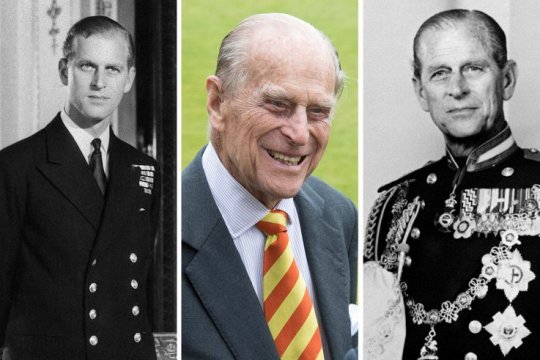
Contrary to what some might think I’m not really a fan girl when it comes to the royal family. I don’t religiously follow their every movement or utterance especially as I live in Paris and therefore I don’t really care about tabloid tittle tattle. I only get to hear of anything to do with the royal family when I speak to my parents or my great aunts and uncles for whom the subject is closer to their heart because of the services my family has rendered over past generations to the monarchy and the older (and dying) tight knit social circles they travel in.
Like Walter Bagehot, I’m more interested in the monarchy as an institution and its constitutional place within the historical, social, and political fabric of Britain and its continued delicate stabilising importance to that effect. It was Walter Bagehot, the great constitutional scholar and editor the Economist magazine, who said, “The mystic reverence, the religious allegiance, which are essential to a true monarchy, are imaginative sentiments that no legislature can manufacture in any people.” In his view, a politically-inactive monarchy served the best interests of the United Kingdom; by abstaining from direct rule, the monarch levitated above the political fray with dignity, and remained a respected personage to whom all subjects could look to as a guiding light.
Even as a staunch monarchist I freely confess that there has always been this odd nature of the relationship between hereditary monarchy and a society increasingly ambivalent about the institution. To paraphrase Bagehot again, there has been too much ‘daylight’ shone onto the ‘magic’ of the monarchy because we are obsessed with personalities as celebrities.
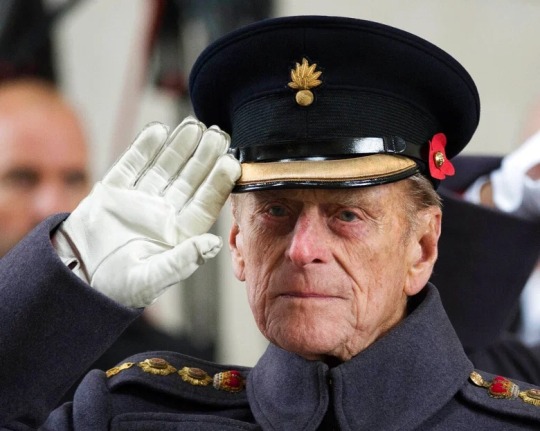
Having said that I did feel saddened by the passing of Prince Philip, the Duke of Edinburgh. After the Queen, he was my favourite royal. Anne, Princess Royal, would come next because she is very much like her father in temperament, humour, and character, so unlike her other brothers.
I have met the late Prince Philip when I was serving in the army in a few regimental meet-and-greet situations - which as you may know is pretty normal given that members of the royal family serve as honorary colonel-in-chiefs (patrons in effect) of all the British army regiments and corps.I also saw him at one or two social events such the annual charitable Royal Caledonian Ball (he’s an expert scottish reeler) and the Guards Polo Club where my older brothers played.
I’ll will freely confess that he was the one royal I could come close to identify with because his personal biography resonated with me a great deal.
Let’s be honest, the core Windsor family members, born to privilege, are conditioned and raised to be dull. Perhaps that’s a a tad harsh. I would prefer the term ‘anonymously self-effacing’, just another way of saying ‘for God’s sake don’t draw attention to yourself by saying or doing anything even mildly scandalous or political lest it invites public opprobrium and scrutiny’. The Queen magnificently succeeds in this but the others from Charles down just haven’t (with the exception of Princess Anne).
However, many people forget this obvious fact that it’s the incoming husbands and wives who marry into the Windsor family who are relied upon to bring colour and even liven things up a little. And long before Kate Middleton, Meghan Markle (very briefly), or Lady Diana Spencer, were the stars of ‘The Firm’- a phrase first coined by King George VI, Queen Elizabeth II's father who ruled from 1936 to 1952, who was thought to have wryly said, "British royals are 'not a family, we're a firm,” - it was Prince Philip who really livened things up and made the greater impact on the monarchy than any of them in the long term.
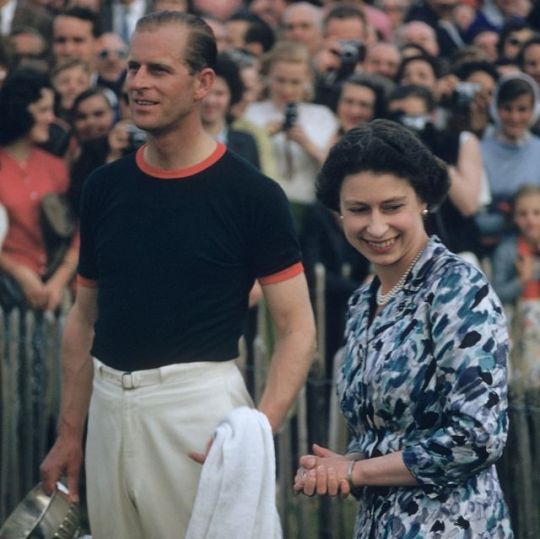
Prince Philip’s passing belied the truth of a far more complex individual: a destitute and penniless refugee Greek-Danish prince with a heart breaking backstory that could have been penned by any 19th Century novelist, and also eagle eyed reformer who tried to drag the royal family into the 20th century. At the core of the man - lost scion of a lost European royal dynasty, a courageous war veteran, and Queen’s consort - were values in which he attempted to transform and yet maintain much older inherited traditions and attitudes. Due to his great longevity, Philip’s life came to span a period of social change that is almost unprecedented, and almost no one in history viewed such a transformation from the front row.
Prince Philip would seem to represent in an acute form the best of the values of that era, which in many ways jar with today’s. He had fought with great courage in the war as a dashing young naval officer; he was regularly rude to foreigners, which was obviously a bonus to all Brits. He liked to ride and sail and shoot things. He was unsentimental almost to a comic degree, which felt reassuring at a time when a new-found emotional incontinence made many feel uncomfortable. Outrageous to some but endearing to others, he was the sort of man you’d want to go for a pint with, perhaps the ultimate compliment that an Englishman can pay to another Englishman. This has its own delicious irony as he wasn’t really an Englishman.
There are 4 takeways I would suggest in my appraisal of Prince Philip that stand out for me. So let me go through each one.
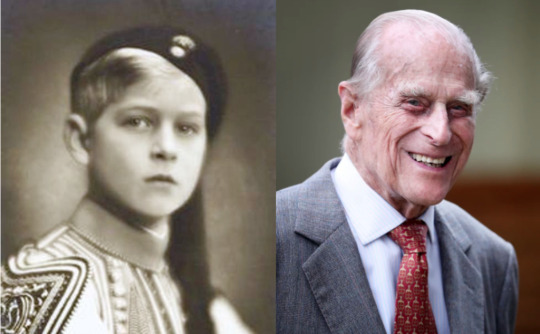
1. Prince Philip’s Internationalism
It may seem odd for me to say that Prince Philip wasn’t English but he wasn’t an Englishman in any real sense. He was a wretch of the world - stateless, homeless, and penniless. That the Prince of Nowhere became the British Monarchy’s figurehead was more than fitting for a great age of migration and transition in which the Royal Family survived and even flourished. That he was able to transform himself into the quintessential Englishman is testimony not just to his personal determination but also to the powerful cultural pull of Britishness.
He was born on a kitchen table in Corfu in June 1921. A year later in 1922, Philip, as the the great-great-grandson of Queen Victoria and nephew of Constantine I of Greece, was forced to flee with his family after the abdication of Constantine. He grew up outside Paris speaking French; ethnically he was mostly German although he considered himself Danish, his family originating from the Schleswig border region. He was in effect, despite his demeanour of Royal Navy officer briskness, a citizen of nowhere in an age of movement. From a very young age he was a stateless person, nationally homeless. Indeed, Philip was an outsider in a way that even Meghan Markle could never be; at his wedding in 1947, his three surviving sisters and two brothers-in-law were not permitted to attend because they were literally Britain’s enemies, having fought for the Germans. A third brother-in-law had even been in the SS, working directly for Himmler, but had been killed in the conflict.
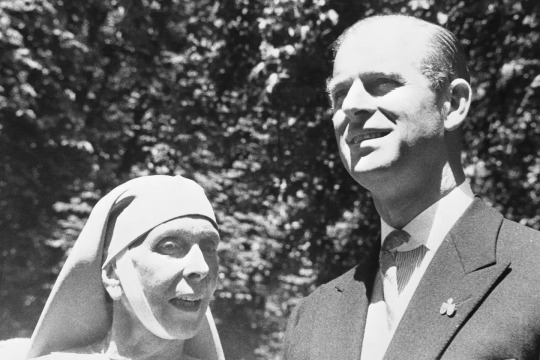
Even his religion was slightly exotic. He was Greek Orthodox until he converted to Anglicanism on marrying Elizabeth - what with his wife due to become supreme head of the Church and everything - but his ties with eastern Christianity remained. His great-aunts Princess Elisabeth of Hesse and by Rhine and Tsarina Alexandra are both martyrs of the Russian Orthodox Church, having been murdered by the Bolsheviks; Philip’s mother went on to become an Orthodox nun and a “Righteous Among the Nations” for saving a Jewish family during the Nazi occupation of Greece, spending much of her time in squalid poverty.
His parents were part of the largely German extended aristocracy who ruled almost all of Europe before it all came crashing down in 1918. When he died, aged 99, it marked a near-century in which all the great ideological struggles had been and gone; he had been born before the Soviet Union but outlived the Cold War, the War on Terror and - almost - Covid-19.
The world that Philip was born into was a far more violent and dangerous place than ours. In the year he was born, Irish rebels were still fighting Black and Tans; over the course of 12 months the Spanish and Japanese prime ministers were assassinated, there was a coup in Portugal and race riots in the United States. Germany was rocked by violence from the far-Left and far-Right, while in Italy a brutal new political movement, the Fascists, secured 30 seats in parliament, led by a trashy journalist called Benito Mussolini.
The worst violence, however, took place in Greece and Turkey. Following the defeat of the Ottoman Empire, what remained of Turkey was marked for permanent enfeeblement by the Allies. But much to everyone’s surprise the country’s force were roused by the brilliant officer Mustafa Kemal, who led the Turks to victory. Constantinople was lost to Christendom for good and thousands of years of Hellenic culture was put to the flames in Smyrna.
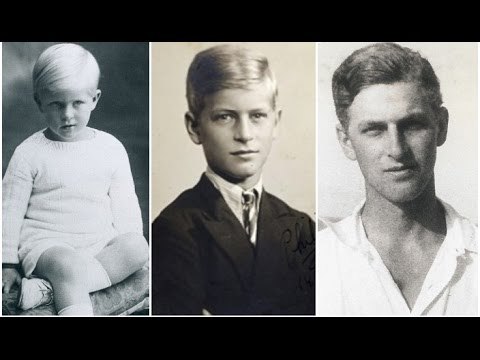
The Greek royal family, north German imports shipped in during the 19th century, bore much of the popular anger for this disaster. King Constantine fled to Italy, and his brother Andrew was arrested and only escaped execution through the intervention of his relative Britain’s George V. Andrew’s wife Alice, their four daughters and infant son Philip fled to France, completely impoverished but with the one possession that ensures that aristocrats are never truly poor: connections.
Philip had a traumatic childhood. He was forged by the turmoil of his first decade and then moulded by his schooling. His early years were spent wandering, as his place of birth ejected him, his family disintegrated and he moved from country to country, none of them ever his own. When he was just a year old, he and his family were scooped up by a British destroyer from his home on the Greek island of Corfu after his father had been condemned to death. They were deposited in Italy. One of Philip's first international journeys was spent crawling around on the floor of the train from an Italian port city, "the grubby child on the desolate train pulling out of the Brindisi night," as his older sister Sophia later described it.
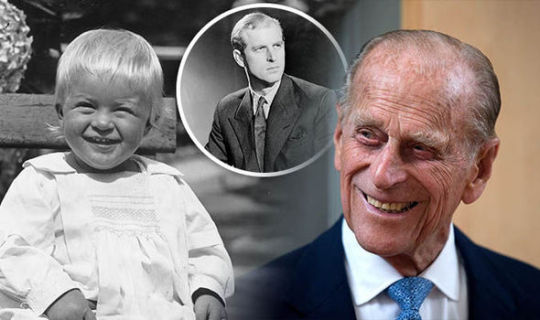
In Paris, he lived in a house borrowed from a relative; but it was not destined to become a home. In just one year, while he was at boarding school in Britain, the mental health of his mother, Princess Alice, deteriorated and she went into an asylum; his father, Prince Andrew, went off to Monte Carlo to live with his mistress. "I don't think anybody thinks I had a father," he once said. Andrew would die during the war. Philip went to Monte Carlo to pick up his father's possessions after the Germans had been driven from France; there was almost nothing left, just a couple of clothes brushes and some cuff-links.
Philip’s four sisters were all much older, and were soon all married to German aristocrats (the youngest would soon die in an aeroplane crash, along with her husband and children). His sisters became ever more embroiled in the German regime. In Scotland going to Gordonstoun boarding school, Philip went the opposite direction, becoming ever more British. Following the death of his sister Cecilie in a plane crash in 1937, the gulf widened. As the clouds of conflict gathered, the family simply disintegrated. With a flash of the flinty stoicism that many would later interpret, with no little justification, as self-reliance to the point of dispassion, the prince explained: “It’s simply what happened. The family broke up… I just had to get on with it. You do. One does.”
In the space of 10 years he had gone from a prince of Greece to a wandering, homeless, and virtually penniless boy with no-one to care for him. He got through it by making a joke of everything, and by being practical.
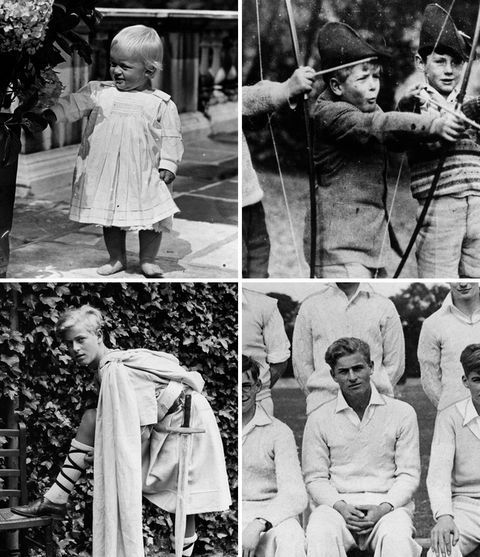
By the time he went to Gordonstoun, a private boarding school on the north coast of Scotland, Philip was tough, independent and able to fend for himself; he'd had to be. Gordonstoun would channel those traits into the school's distinct philosophy of community service, teamwork, responsibility and respect for the individual. And it sparked one of the great passions of Philip's life - his love of the sea. It was Gordonstoun that nurtured that love through the maturation of his character.
Philip adored the school as much as his son Charles would despise it. Not just because the stress it put on physical as well as mental excellence - he was a great sportsman. But because of its ethos, laid down by its founder Kurt Hahn, a Jewish exile from Nazi Germany.
Hahn first met Philip as a boy in Nazi Germany. Through a connection via one of his sister’s husbands, Philip, the poor, lonely boy was first sent off to a new school - in Nazi Germany. Which was as fun as can be imagined. Schloss Salem had been co-founded by stern educator called Kurt Hahn, a tough, discipline-obsessed conservative nationalist who saw civilisation in inexorable decline. But by this stage Hahn, persecuted for being Jewish in Nazi Germany, had fled to Britain, and Philip did not spend long at the school either, where pressure from the authorities was already making things difficult for the teachers. Philip laughed at the Nazis at first, because their salute was the same gesture the boys at his previous school had to make when they wanted to go to the toilet, but within a year he was back in England, a refugee once again.
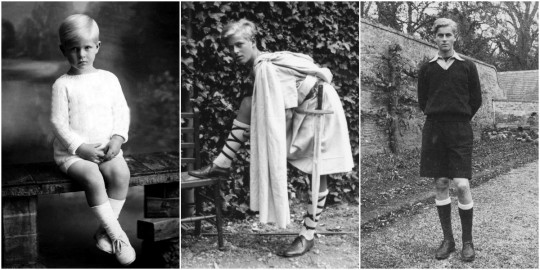
Philip happily attended Hahn’s new school, Gordonstoun, which the strict disciplinarian had set up in the Scottish Highlands. Inspired by Ancient Sparta, the boys (and then later girls) had to run around barefoot and endure cold showers, even in winter, the whole aim of which was to drive away the inevitable civilisational decay Hahn saw all around him. To 21st century ears it sounds like hell on earth, yet Philip enjoyed it, illustrating just what a totally alien world he came from.
That ethos became a significant, perhaps the significant, part of the way that Philip believed life should be lived. It shines through the speeches he gave later in his life. "The essence of freedom," he would say in Ghana in 1958, "is discipline and self-control." The comforts of the post-war era, he told the British Schools Exploring Society a year earlier, may be important "but it is much more important that the human spirit should not be stifled by easy living". And two years before that, he spoke to the boys of Ipswich School of the moral as well as material imperatives of life, with the "importance of the individual" as the "guiding principle of our society".
It was at Gordonstoun one of the great contradictions of Philip's fascinating life was born. The importance of the individual was what in Kurt Hahn's eyes differentiated Britain and liberal democracies from the kind of totalitarian dictatorship that he had fled. Philip put that centrality of the individual, and individual agency - the ability we have as humans to make our own moral and ethical decisions - at the heart of his philosophy.

At Dartmouth Naval College in 1939, the two great passions of his life would collide. He had learned to sail at Gordonstoun; he would learn to lead at Dartmouth. And his driving desire to achieve, and to win, would shine through. Despite entering the college far later than most other cadets, he would graduate top of his class in 1940. In further training at Portsmouth, he gained the top grade in four out of five sections of the exam. He became one of the youngest first lieutenants in the Royal Navy.
The navy ran deep in his family. His maternal grandfather had been the First Sea Lord, the commander of the Royal Navy; his uncle, "Dickie" Mountbatten, had command of a destroyer while Philip was in training. In war, he showed not only bravery but guile. It was his natural milieu. "Prince Philip", wrote Gordonstoun headmaster Kurt Hahn admiringly, "will make his mark in any profession where he will have to prove himself in a trial of strength".
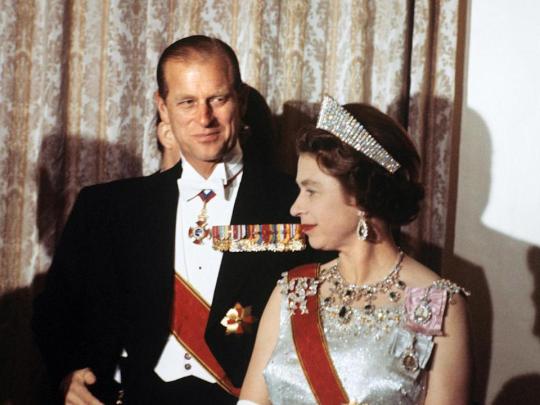
2. Prince Philip and the modernisation of the monarchy
In his own words, the process of defining what it meant to be a royal consort was one of “trial and error.” Speaking with BBC One’s Fiona Bruce in 2011, Philip explained, “There was no precedent. If I asked somebody, 'What do you expect me to do?' they all looked blank. They had no bloody idea, nobody had much idea.” So he forged for himself a role as a moderniser of the monarchy.
He could not have had much idea back in 1939. Back then in Dartmouth in 1939, as war became ever more certain, the navy was his destiny. He had fallen in love with the sea itself. "It is an extraordinary master or mistress," he would say later, "it has such extraordinary moods." But a rival to the sea would come.
When King George VI toured Dartmouth Naval College, accompanied by Philip's uncle, he brought with him his daughter, Princess Elizabeth. Philip was asked to look after her. He showed off to her, vaulting the nets of the tennis court in the grounds of the college. He was confident, outgoing, strikingly handsome, of royal blood if without a throne. She was beautiful, a little sheltered, a little serious, and very smitten by Philip.
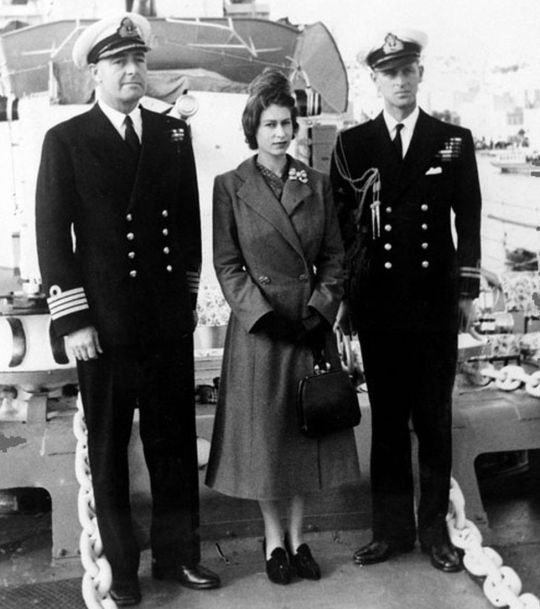
Did he know then that this was a collision of two great passions? That he could not have the sea and the beautiful young woman? For a time after their wedding in 1948, he did have both. As young newlyweds in Malta, he had what he so prized - command of a ship - and they had two idyllic years together. But the illness and then early death of King George VI brought it all to an end.
He knew what it meant, the moment he was told. Up in a lodge in Kenya, touring Africa, with Princess Elizabeth in place of the King, Philip was told first of the monarch's death in February 1952. He looked, said his equerry Mike Parker, "as if a ton of bricks had fallen on him". For some time he sat, slumped in a chair, a newspaper covering his head and chest. His princess had become the Queen. His world had changed irrevocably.
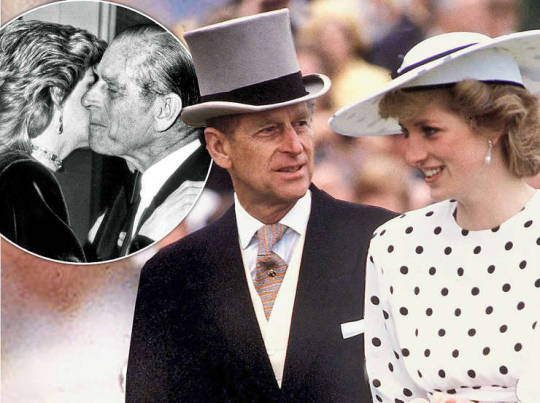
While the late Princess Diana was later to famously claim that there were “three people” in her marriage - herself, Prince Charles and Camilla - there were at least 55 million in Philip and Elizabeth’s. As Elizabeth dedicated her life to her people at Westminster Abbey at the Coronation on June 2, 1953, it sparked something of an existential crisis in Philip. Many people even after his death have never really understood this pivotal moment in Philip’s life. All his dreams of being a naval officer and a life at sea as well as being the primary provider and partner in his marriage were now sacrificed on the altar of duty and love.
With his career was now over, and he was now destined to become the spare part. Philip, very reasonably, asked that his future children and indeed his family be known by his name, Mountbatten. In effect he was asking to change the royal family’s name from the House of Windsor to the House of Mountbatten. But when Prime Minister Winston Churchill got wind of it as well as the more politically agile courtiers behind the Queen, a prolonged battle of wits ensued, and it was one Philip ultimately lost. It was only in 1957 that he accepted the title of “Prince.”
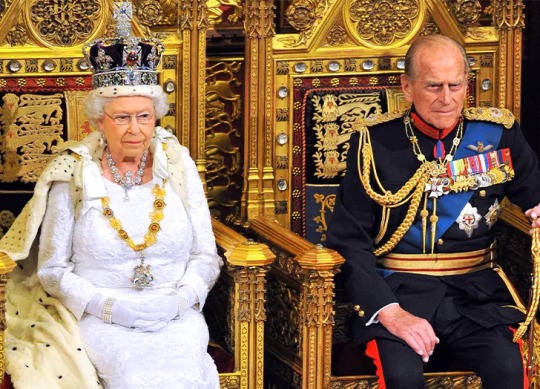
Even though he had almost lost everything dear to him and his role now undefined, he didn’t throw himself a pity party. He just got on with it. Philip tried to forge his own distinct role as second fiddle to the woman who had come to represent Great Britain. He designated himself the First Officer of the Good Ship Windsor. He set about dusting off some of the cobwebs off the throne and letting some daylight unto the workings of the monarchy by advocating reasonable amount of modernisation of the monarchy.
He had ideas about modernising the royal family that might be called “improving optics” today. But in his heart of hearts he didn’t want the monarchy to become a stuffy museum piece. He envisaged a less stuffy and more popular monarchy, relevant to the lives of ordinary people. Progress was always going to be incremental as he had sturdy opposition from the old guard who wanted to keep everything as it was, but nevertheless his stubborn energy resulted in significant changes.
When a commission chaired by Prince Philip proposed broadcasting the 1953 investiture ceremony that formally named Elizabeth II as queen on live television, Prime Minister Winston Churchill reacted with outright horror, declaring, “It would be unfitting that the whole ceremony should be presented as if it were a theatrical performance.” Though the queen had initially voiced similar concerns, she eventually came around to the idea, allowing the broadcast of all but one segment of the coronation. Ultimately, according to the BBC, more than 20 million people tuned in to the televised ceremony - a credit to the foresight of Philip.
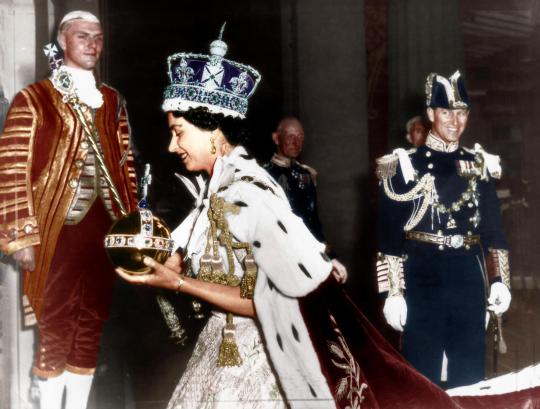
Elizabeth’s coronation marked a watershed moment for a monarchy that has, historically, been very hands off, old-fashioned and slightly invisible. Over the following years, the royals continued to embrace television as a way of connecting with the British people: In 1957, the queen delivered her annual Christmas address during a live broadcast. Again, this was Philip’s doing when he cajoled the Queen to televise her message live. He even helped her in how to use the teleprompter to get over her nerves and be herself on screen.
Four years later, in 1961, Philip became the first family member to sit for a television interview. It is hard for us to imagine now but back then it was huge. For many it was a significant step in modernising the monarchy.
Though not everything went to plan. Toward the end of the decade, the Windsors even invited cameras into their home. A 1969 BBC fly-on-the-wall documentary, instigated by Philip to show life behind the scenes, turned into an unmitigated disaster: “The Windsors” revealed the royals to be a fairly normal, if very rich, British upper-class family who liked barbecues, ice cream, watching television and bickering. The mystery of royalty took a hit below the waterline from their own torpedo, a self-inflicted wound from which they took a long time to recover. Shown once, the documentary was never aired again. But it had an irreversible effect, and not just by revealing the royals to be ordinary. By allowing the cameras in, Philip opened the lid to the prying eyes of the paparazzi who could legitimately argue that since the Royals themselves had sanctioned exposure, anything went. From then on, minor members of the House of Windsor were picked off by the press, like helpless tethered animals on a hunting safari.
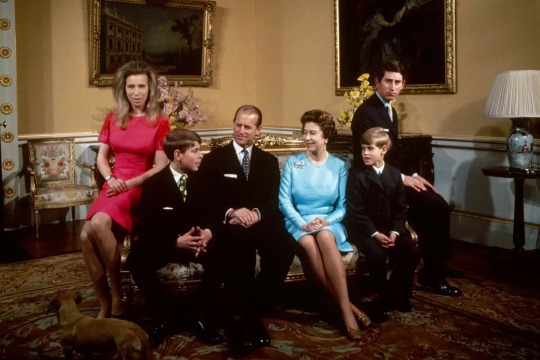
Prince Philip also took steps to reorganise and renovate the royal estates in Sandringham and Balmoral such as intercoms, modern dish washers, generally sought to make the royal household and the monarchy less stuffy, not to have so much formality everywhere.
Philip helped modernised the monarchy in other ways to acknowledge that the monarchy could be responsive to changes in society. It was Prince Philip - much to the chagrin of the haughty Princess Margaret and other stuffy old courtiers - who persuaded the Queen to host informal lunches and garden parties designed to engage a broader swath of the British public. Conversely, Prince Philip heartily encouraged the Queen (she was all for it apparently but was still finding her feet as a new monarch) to end the traditional practice of presenting debutantes from aristocratic backgrounds at court in 1952. For Philip and others it felt antiquated and out of touch with society. I know in speaking to my grandmother and others in her generation the decision was received with disbelief at how this foreign penniless upstart could come and stomp on the dreams of mothers left to clutch their pearls at the prospect there would be no shop window for their daughter to attract a suitable gentleman for marriage. One of my great aunts was over the moon happy that she never would have to go through what she saw as a very silly ceremony because she preferred her muddy wellies to high heels.

A former senior member of the royal household, who spent several years working as one of Prince Philip’s aides, and an old family friend, once told us around a family dinner table that the Duke of Edinburgh was undoubtedly given a sense of permanence by his marriage into the Royal Family that was missing from earlier years. But the royal aide would hastily add that Prince Philip, of course, would never see it that way.
Prince Philip’s attitude was to never brood on things or seek excuses. And he did indeed get on with the job in his own way - there should be no doubt that when it came to building and strengthening the Royal Family it was a partnership of equals with the Queen. Indeed contrary to Netflix’s hugely popular series ‘The Crown’ and its depiction of the royal marriage with Philip’s resentment at playing second fiddle, the prince recognised that his “first duty was to serve the Queen in the best way I could,” as he told ITV in 2011. Though this role was somewhat ill-suited to his dynamic, driven, and outspoken temperament, Philip performed it with utter devotion.
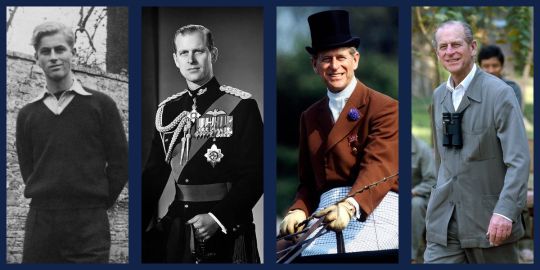
3. Prince Philip’s legacy
One could argue rightly that modernising the monarchy was his lasting legacy achievement. But he also tried to modernise a spent and exhausted Britain as it emerged from a ruinous war. When peace came, and with it eventual economic recovery, Philip would throw himself into the construction of a better Britain, urging the country to adopt scientific methods, embracing the ideas of industrial design, planning, education and training. A decade before Harold Wilson talked of the "white heat of the technological revolution", Philip was urging modernity on the nation in speeches and interviews. He was on top of his reading of the latest scientific breakthroughs and well read in break out innovations.
This interest in modernisation was only matched by his love for nature. As the country and the world became richer and consumed ever more, Philip warned of the impact on the environment, well before it was even vaguely fashionable. As president of the World Wildlife Fund (WWF) in the UK for more than 20 years from 1961, he was one of the first high-profile advocates of the cause of conservation and biological diversity at a time when it was considered the preserve of an eccentric few.
For a generation of school children in Britain and the Commonwealth though, his most lasting legacy and achievement will be the Duke of Edinburgh Awards (DofE). He set up the Duke of Edinburgh award, a scheme aimed at getting young people out into nature in search of adventure or be of service to their communities. It was a scheme that could match the legacy of Baden Powell’s scouts movement.
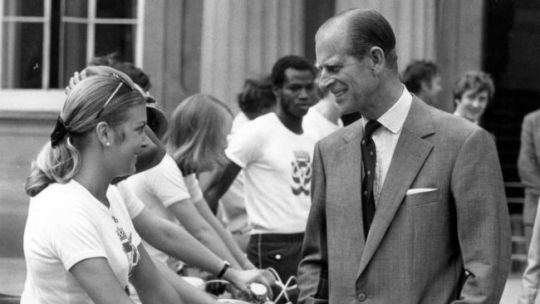
When Prince Philip first outlined his idea of a scheme to harness the values of his education at Gordonstoun by bringing character-building outdoor pursuits to the many rather than the fee-paying few, he received short shrift from the government of the day. The then minister of education, Sir David Eccles responded to the Duke’s proposal by saying: “I hear you’re trying to invent something like the Hitler Youth.” Undeterred he pushed on until it came to fruition.
I’m so glad that he did. I remember how proud I was for getting my DofE Awards while I was at boarding school. With the support of great mentors I managed to achieve my goals: collecting second-hand English books for a literacy programme for orphaned street children in Delhi, India with a close Indian school friend and her family; and completing a 350 mile hike following St. Olav’s Pilgrimmage Trail from Selånger, on the east coast of Sweden, and ending at Nidaros Cathedral in Trondheim, on the west coast of Norway.
It continues to be an enduring legacy. Since its launch in 1956, the Duke of Edinburgh awards have been bestowed upon some 2.5 million youngsters in Britain and some eight million worldwide. For a man who once referred to himself as a “Greek princeling of no consequence”, his pioneering tutelage of these two organisations (alongside some 778 other organisations of which he was either president or a patron) would be sufficient legacy for most.
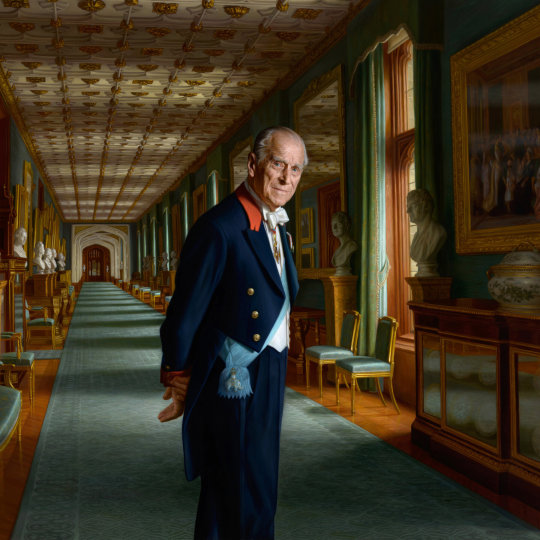
4. Prince Philip’s character
It may surprise some but what I liked most about Prince Philip was the very thing that helped him achieve so much and leave a lasting legacy: his character.
It is unhelpful to the caricature of Prince Philip as an unwavering but pugnacious consort whose chief talent was a dizzying facility in off-colour one-liners that he was widely read and probably the cleverest member of his family.
His private library at Windsor consists of 11,000 tomes, among them 200 volumes of poetry. He was a fan of Jung, TS Eliot, Shakespeare and the cookery writer Elizabeth David. As well as a lifelong fascination with science, technology and sport, he spoke fairly fluent French, painted and wrote a well received book on birds. It’s maddening to think how many underestimated his genuine intellect and how cultured he was behind the crusty exterior.
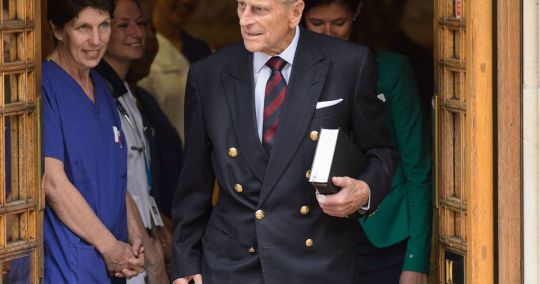
He didn’t have an entourage to fawn around him. He was the first to own a computer at Buckingham Palace. He answered his own phone and wrote and responded to his own correspondence. By force of character he fought the old guard courtiers at every turn to modernise the monarchy against their stubborn resistance.
Prince Philip was never given to self-analysis or reflection on the past. Various television interviewers tried without success to coerce him in to commenting on his legacy.But once when his guard was down he asked on the occasion of his 90th birthday what he was more proud of, he replied with characteristic bluntness: “I couldn’t care less. Who cares what I think about it, I mean it’s ridiculous.”
All of which neatly raises the profound aversion to fuss and the proclivity for tetchiness often expressed in withering put-downs that, for better or worse, will be the reflex memory for many of the Duke of Edinburgh. If character is a two edged sword so what of his gaffes?
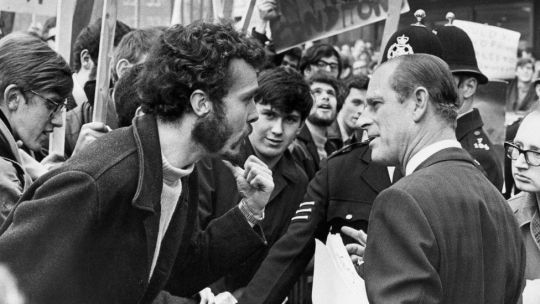
There is no doubt his cult status partly owed to his so-called legendary gaffes, of which there are enough to fill a book (indeed there is a book). But he was no racist. None of the Commonwealth people or foreign heads of state ever said this about him. Only leftist republicans with too much Twitter time on their hands screamed such a ridiculous accusation. They’re just overly sensitive snowflakes and being devoid of any humour they’re easily triggered.
There was the time that Philip accepted a gift from a local in Kenya, telling her she was a kind woman, and then adding: “You are a woman, aren’t you?” Or the occasion he remarked “You managed not to get eaten, then?” to a student trekking in Papua New Guinea. Then there was his World Wildlife Fund speech in 1986, when he said: “If it has got four legs and it is not a chair, if it has got two wings and it flies but is not an aeroplane, and if it swims and it is not a submarine, the Cantonese will eat it.” Well, he wasn’t wrong.

Philip quickly developed a reputation for what he once defined, to the General Dental Council, as “dentopedology – the science of opening your mouth and putting your foot in it”. Clearly he could laugh at himself as he often did as an ice breaker to put others at ease.
His remarking to the president of Nigeria, who was wearing national dress, “You look like you’re ready for bed”, or advising British students in China not to stay too long or they would end up with “slitty eyes”, is probably best written off as ill-judged humour. Telling a photographer to “just take the fucking picture” or declaring “this thing open, whatever it is”, were expressions of exasperation or weariness with which anyone might sympathise.
Above all, he was also capable of genuine if earthy wit, saying of his horse-loving daughter Princess Anne: “If it doesn’t fart or eat hay she isn’t interested.” Many people might have thought it but few dared say it. If Prince Philip’s famous gaffes provoked as much amusement as anger, it was precisely because they seem to give voice to the bewilderment and pent-up frustrations with which many people viewed the ever-changing modern world.
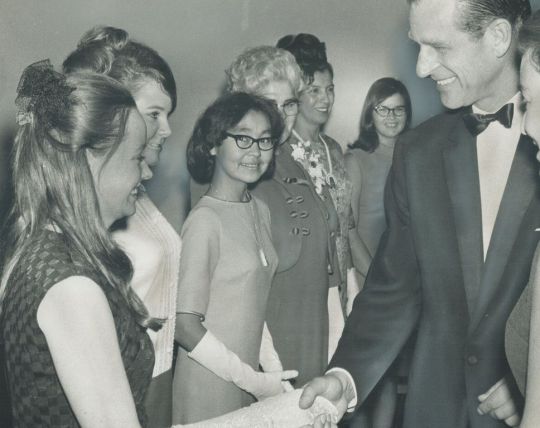
A former royal protection officer recounts how while on night duty guarding a visiting Queen and consort, he engaged in conversation with colleagues on a passing patrol. It was 2am and the officer had understood the royal couple to be staying elsewhere in the building until a window above his head was abruptly slammed open and an irate Prince Philip stuck his head out of the window to shout: “Would you fuck off!” Without another word, he then shut the window.
The Duke at least recognised from an early age that he was possessed of an abruptness that could all too easily cross the line from the refreshingly salty to crass effrontery.
One of his most perceptive biographers, Philip Eade, recounted how at the age of 21 the prince wrote a letter to a relation whose son had recently been killed in combat. He wrote: “I know you will never think much of me. I am rude and unmannerly and I say things out of turn which I realise afterwards must have hurt someone. Then I am filled with remorse and I try to put matters right.”
In the case of the royal protection officer, the Duke turned up in the room used by the police officers when off duty and said: “Terribly sorry about last night, wasn’t quite feeling myself.”
Aides have also ventured to explain away some of their employer’s more outlandish remarks - from asking Cayman islanders “You are descended from pirates aren’t you?” to enquiring of a female fashion writer if she was wearing mink knickers - as the price of his instinctive desire to prick the pomposity of his presence with a quip to put others at ease.

Indeed many people forget that his ‘gaffes’ were more typical of the clubbish humour of the British officer class – which of course would be less appreciated, sometimes even offensive, to other ears. It’s why he could relate so well to veterans who enjoyed his bonhomie company immensely.
But behind the irascibility, some have argued there also lay a darker nature, unpleasantly distilled in his flinty attitude to his eldest son. One anecdote tells of how, in the aftermath of the murder of the Duke’s uncle and surrogate father, Lord Mountbatten, Philip lectured his son, who was also extremely fond of his “honorary grandfather”, that he was not to succumb to self-pity. Charles left the room in tears and when his father was asked why he had spoken to his son with so little compassion, the Duke replied: “Because if there’s any crying to be done I want it to happen within this house, in front of his family, not in public. He must be toughened up, right now.”
But here I would say that Prince Philip’s intentions were almost always sincere and in no way cruel. He has always tried to protect his family - even from their own worst selves or from those outside the family ‘firm’ who may not have their best interest at heart.
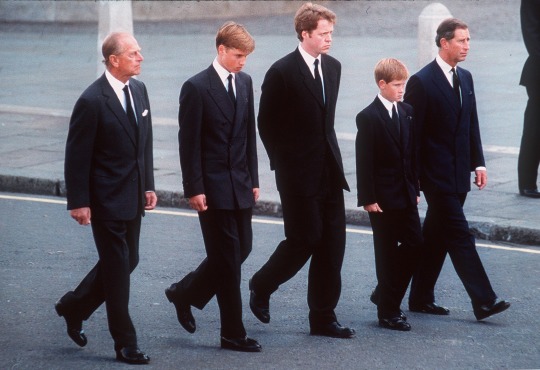
In 1937, a 16-year-old Prince Philip had walked behind his elder sister Cecile’s coffin after she was killed in a plane crash while heavily pregnant. The remains of newly-born infant found in the wreckage suggested the aircraft had perished as the pilot sought to make an emergency landing in fog as the mother entered childbirth. It was an excruciating taste of tragedy which would one day manifest itself in a very princely form of kindness that was deep down that defined Philip’s character.
When about 60 years later Prime Minister Tony Blair’s spin doctors in Downing Street tried to strong arm the Queen and the royal household over the the arrangements for the late Prince Diana’s funeral, it was Philip who stepped in front to protect his family. The Prime Minister and his media savvy spin doctors wanted the two young princes, William and Harry, to walk behind the coffin.
The infamous exchange was on the phone during a conference call between London and Balmoral, and the emotional Philip was reportedly backed by the Queen. The call was witnessed by Anji Hunter, who worked for Mr Blair. She said how surprised she was to hear Prince Philip’s emotion. ‘It’s about the boys,” he cried, “They’ve lost their mother”. Hunter thought to herself, “My God, there’s a bit of suffering going on up there”.’
Sky TV political commentator Adam Boulton (Anji Hunter’s husband) would write in his book Tony’s Ten Years: ‘The Queen relished the moment when Philip bellowed over the speakerphone from Balmoral, “Fuck off. We are talking about two boys who have just lost their mother”. Boulton goes on to say that Philip: ‘…was trying to remind everyone that human feelings were involved. No 10 were trying to help the Royals present things in the best way, but may have seemed insensitive.’

In the end the politicians almost didn’t get their way. Prince Philip stepped in to counsel his grandson, Prince William, after he had expressed a reluctance to follow his mother’s coffin after her death in Paris. Philip told the grieving child: “If you don’t walk, I think you’ll regret it later. If I walk, will you walk with me?”
It’s no wonder he was sought as a counsellor by other senior royals and especially close to his grandchildren, for whom he was a firm favourite. His relationship with Harry was said to have become strained, however, following the younger Prince’s decision to reject his royal inheritance for a life away from the public eye in America with his new American wife, Meghan Markle. For Prince Philip I am quite sure it went against all the elder Prince had lived his life by - self-sacrifice for the greater cause of royalty.
This is the key to Philip’s character and in understanding the man. The ingrained habits of a lifetime of duty and service in one form or another were never far away.
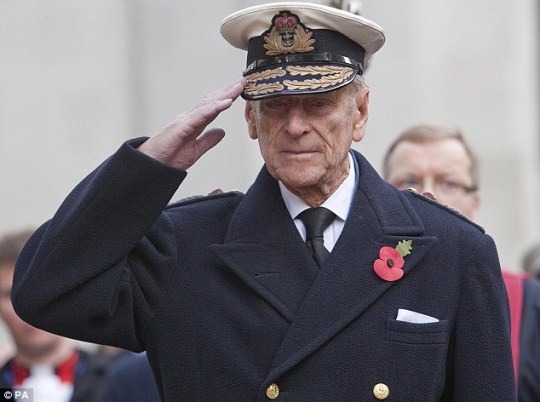
In conclusion then....
After more time passes I am sure historians will make a richer reassessment of Prince Philip’s life and legacy. Because Prince Philip was an extraordinary man who lived an extraordinary life; a life intimately connected with the sweeping changes of our turbulent 20th Century, a life of fascinating contrast and contradiction, of service and some degree of solitude. A complex, clever, eternally restless man that not even the suffocating protocols of royalty and tradition could bind him.
Although he fully accepted the limitations of public royal service, he did not see this as any reason for passive self-abnegation, but actively, if ironically, identified with his potentially undignified role. It is this bold and humorous embrace of fated restriction which many now find irksome: one is no longer supposed to mix public performance with private self-expression in quite this manner.
Yet such a mix is authentically Socratic: the proof that the doing of one’s duty can also be the way of self-fulfilment. The Duke’s sacrifice of career to romance and ceremonial office is all the more impressive for his not hiding some annoyance. The combination of his restless temperament and his deeply felt devotion to duty found fruitful expression; for instance, in the work of Saint George’s House Windsor - a centre and retreat that he created with Revd. Robin Woods - in exploring religious faith, philosophy, and contemporary issues.
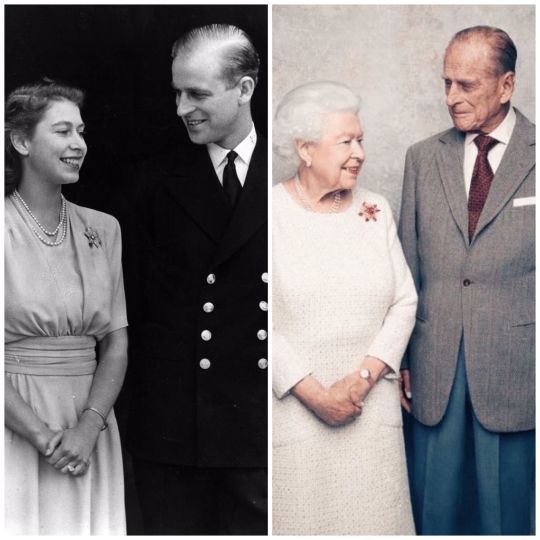
Above all he developed a way to be male that was both traditional and modern. He served one woman with chivalric devotion as his main task in life while fulfilling his public engagements in a bold and active spirit. He eventually embraced the opportunity to read and contemplate more. And yet, he remained loyal to the imperatives of his mentor Kurt Hahn in seeking to combine imagination with action and religious devotion with practical involvement.
Prince Philip took more pride in the roles he had accidentally inherited than in the personal gifts which he was never able fully to develop. He put companionship before self-realisation and acceptance of a sacred symbolic destiny before the mere influencing of events. In all these respects he implicitly rebuked our prevailing meritocracy which over-values officially accredited attainment, and our prevailing narcissism which valorises the assertion of discrete identities.
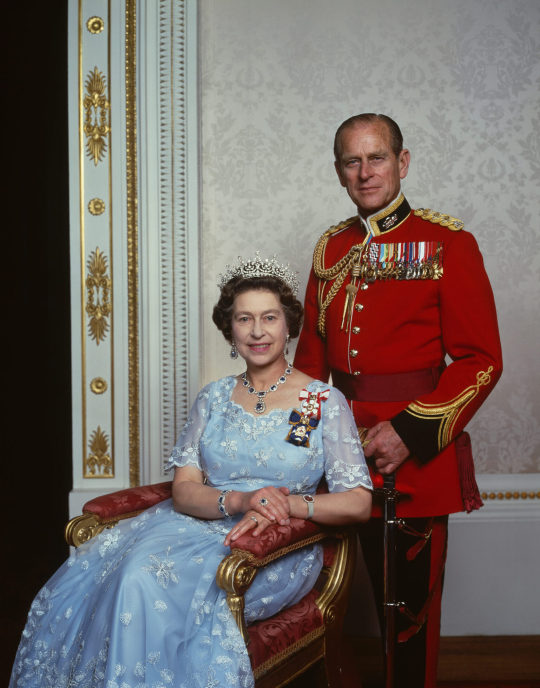
Prince Philip was Britain’s longest-serving consort. He was steadfast, duty driven, and a necessary adjunct to the continuity and stability of the Queen and the monarchy. Of all the institutions that have lost the faith of the British public in this period - the Church, Parliament, the media, the police - the Monarchy itself has surprisingly done better than most at surviving, curiously well-adapted to a period of societal change and moral anarchy. The House of Hanover and later Saxe-Coburg and Gotha (changed to Windsor), since their arrival in this country in 1714, have been noted above all for their ability to adapt. And just as they survived the Victorian age by transforming themselves into the bourgeoise, domestic ideal, so they have survived the new Elizabethan era (Harry-Meghan saga is just a passing blip like the Edward-Wallis Simpson saga of the 1930s).
There was once a time when the Royal’s German blood was a punchline for crude and xenophobic satirists. Now it is the royals who are deeply British while the country itself is increasingly cosmopolitan and globalised. British society has seen a greater demographic change than the preceding four or five thousand years combined, the second Elizabethan age has been characterised more than anything by a transformational movement of people. Prince Philip, the Greek-born, Danish-German persecuted and destitute wanderer who came to become one of the Greatest Britons of the past century, perhaps epitomised that era better than anyone else. And he got through it by making a joke of everything, and by being practical.
I hope I don’t exaggerate when I say that in our troubled times over identity, and our place and purpose in the world, we need to heed his selfless example more than ever.

As Heraclitus wisely said, Ήθος ανθρώπω δαίμων (Character is destiny.)
RIP Prince Philip. You were my prince. God damn you, I miss you already.
Thanks for your question.
#question#ask#prince philip#duke of edinburgh#queen elizabeth II#the queen of spades#monarchy#britain#british#royalty#politics#history#culture#europe#crown#icon#great briton#society
284 notes
·
View notes
Text
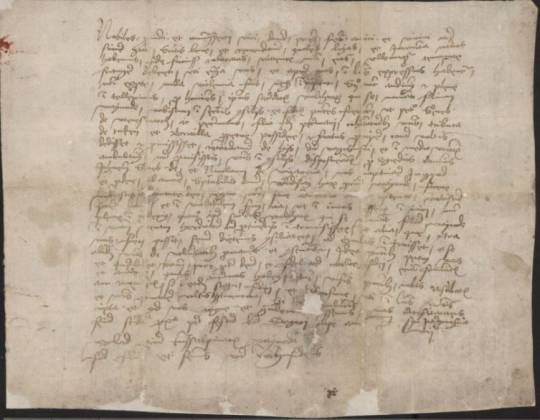

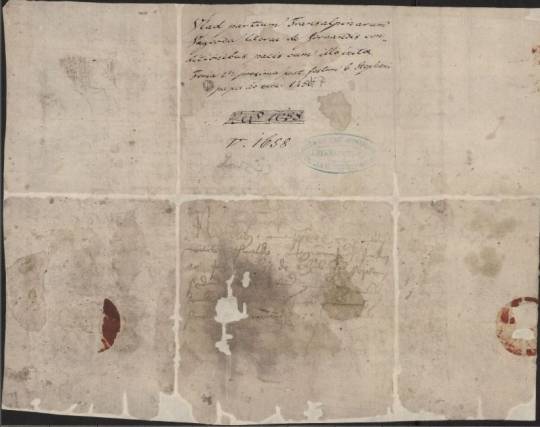
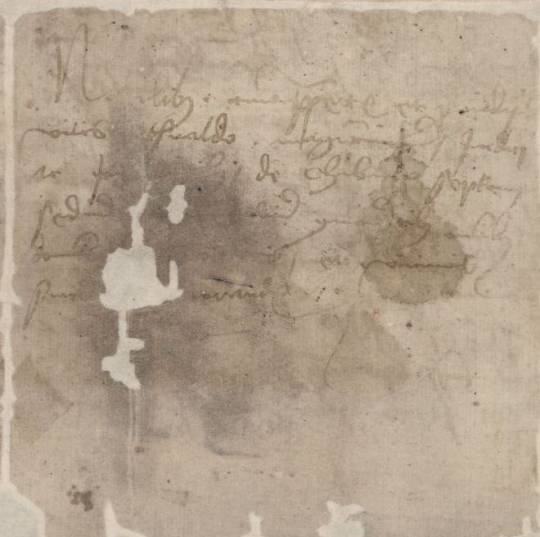



ENG
Letter from the Voivode Vlad Draguli Tepes of March 14, 1457.
***
By content:
This letter finally clarifies the political situation between Wallachia and Transylvania, which became the cause of the conflict in 1457 and later. However, to understand the situation, it is worth reading first two other documents, the first, the agreement between the parties, the terms of assistance, the second, the document of the request for help from the voivode. This document follows in this chain the third, interesting from the point of view of the conflict. After the voivode did not receive an answer, according to the agreement, he goes to the lands where the applicants for the throne of Wallachia and their accomplices are hiding. According to the agreement, if you remember, the party on whose land the applicant and his people are hiding, preferably, betrays (meets the voivode as a friend) intruders, or does not interfere with their search. Probably, the governor did not meet any assistance in Transylvania, which is not surprising, given this attitude. Having crossed the Turnu-Rosu pass and arriving at the places where the aforementioned gentlemen were hiding, but faced with complete indifference, the voivode made an attempt to persuade Transylvania to reckon with itself. The result of this was the burned villages of Kasholts, Khosman and Nou Romyn near the very Sibiu. For decades, Transylvania, which had been shaking the nerves of the governors of Wallachia, was literally shocked by such an act, unprecedented in its kind, so that echoes of indignation reached us in the form of pamphlets, legends, stories, where from year to year, from decade to decade, the number of “innocents” increases, just like the number of "victims". In those stories, it comes to the point where the death toll during that period significantly exceeds even the number of all who lived at that time in one of the largest cities in Transylvania, Brasov.
What exactly prompted the governor to take such a decisive, long-needed step? Was it the indirect participation of Transylvania in all the coups in Wallachia?, the murder of his family?, an attempt on his own murder?. It is unlikely that the voivode was so restrained and patient that, having come to power “without any help,” he concludes a strong peace with Transylvania and approaches it very responsibly. This letter is also very interesting, with a phrase that some historians even interpret as a threat: “If you don’t want even more, then immediately inform us so that we can rule and govern”. However, from the point of view of the choice of vocabulary, "quod nos regere et gubern {are p} ossemus" is completely neutral and, speaking figuratively in modern words, has the following content: the voivode, being a ruler, will be able to begin to regulate the current situation only when he finds out about the further political course of his neighbor, Transylvania, and does not want to be in the dark about that, therefore he asks to inform about his decision. There is nothing else in this phrase, "reign and govern", "herrschen und lenken", in any translation, that is, to be the ruler and therefore to control the situation. For all that, few people focus on the fact that they tried to kill the governor in Transylvania when he needed help.
They also pay little attention to the fact that the voivode expresses, albeit tactfully within the framework of necessary diplomacy, about his attitude to the origin of the applicant: “his infringement on our right of the true (!) Heir”, “a monk from Wallachia who calls himself a son voivode ", the latter is twice specially indicated. Given these moments, I personally cannot understand why Vlad The Monk is definitely considered the illegitimate child of Dragul, when among his sons his father is not mentioned anywhere in the documents, not even once, and one of the sons frankly says that the Monk is an impostor. In my opinion, Vlad Monk is another Neagoe Bassarab, of which, as we remember, there were plenty of them. With only one commander Dragulya Tepes, duplicated Mirchi, Vlada and
forged documents suddenly appeared.
Letter from the governor Vlad Draguli Tepes dated March 14, 1457.
***
Noble, prudent and far-sighted men, advisers, fathers, brothers, our sincerely dear friends and neighbors, as you remember, and you should be well aware of that, there is a commitment between us, and vows backed by unshakable loyalty have been taken; and these obligations and vows must not be violated by anyone and never, while we are alive, at any time, which we personally specifically pointed out to you in a letter. From our side of evil, we did not do you and did not intend to start that. But today a rumor has reached us and we have learned about all that, that at a secret council you were with the people of a monk from Wallachia, who calls himself the son of a governor *, settled their affairs; Moreover, Peter Gereb * from Virishmort, and Peterman *, the son of the noble Peterman, who were neighboring with you, took part in this. You were personally promised to transfer all the fees to you in Rukar and Brail for a long time, promising that Wallachia's income. *
Remember the time when I wandered and arrived in your lands *, you then did not let me into your council, but instead, out of loyalty to the noble lord, the governor of these lands, Vladislav entrusted the noble men John Gereb from Wingard and Nicholas from Salzburg to capture us in the city of Joaju and to end us. But by the will of God, we ourselves were able to return our lands without any help *, but with you, we made a strong peace and thus made your enemies ours. Today we fully understand that you support a monk from Wallachia, who calls himself the son of a governor, and his people in an encroachment on our right to be a true heir, and we also understand what bad consequences for us everything can lead, since you are already Advice with him, and he, having made his way to Amlash, remained there, and is there to this day by your own will. Therefore, with this letter we ask each and every one of you that in the name of the God and according to the commandments of the Catholic faith, as well as for the sake of maintaining fraternal peace and friendship between us, after reading our letter, you will certainly write to us or report back, whether you wish further observe the order established by us and you in writing and be loyal to it. If you do not wish that more, then immediately inform us, so that we can rule and govern.
Given in Targoviste on the second day after the feast of Blessed Pope Gregory, in the year 1457.
Vlad, Commander of the Transalpine lands, your faithful brother, son and friend in everything.
Comments:
* Identity of Vlad the monk is speculative only.
* Peter Gereb * from Virishmort was a judge and head of Sibiu in 1467, later he was executed in the city square because of his participation in the uprising against Corwin considered bloodthirsty). Peterman was a wealthy Sibiu merchant from Wallachia, Kampulung; the city was located on the trade route from Rukar to Brasov. The German-speaking community living there maintained close relations with Sibiu.
* Fees from you in Rukar were the most important source of income for Wallachia, therefore they were never the object of donation or lease. Braila Port, located on the Danube, was the country's most important port and was of exceptional importance for trade in the western Black Sea region. The decision of the self-appointed claimant to take away the income from the country and give it to Transylvania was also unprecedented, his desire to curry favor was painfully strong.
* After an unsuccessful attempt to regain legal power in November 1448, the voivode fled to Moldavia. However, there is no evidence that he was present at the court of Bogdan II. Perhaps he found refuge among the Moldovan boyars who were supporters of his family. Later, the voivode is forced to move to Transylvania, after Vladislav finds himself in the same situation as many voivods before him and therefore loses the support of the Hungarians.
* Joaju (Rom. Geoagiu, ung. Algyógy) is located in the Hunedoara
Sudce, where the Hunyadi family owned vast estates and were surrounded by numerous supporters. The authors of the book Corpus Draculianum contradict themselves, first they write that the Hungarians removed Vladislav because of his pro-Ottoman policy, and then that the murder of the governor could have been ordered by Hunyadi, so that, literally: “Hunyadi wanted to prevent Vlad's attack on Vladislav, so as not to violate the truce with by the Ottomans ". Several different statements. And why would Vlad even then be in Joaju, "where the Hunyadi family owned vast estates and were surrounded by numerous supporters." Honestly, I am alarmed by the attempt of the authors of the book to constantly challenge the words of the voivode in the documents (I often notice in the comments, they say, “the voivode is misleading,” or “in fact, the reason was something else, and not indicated by the voivode” (they apparently, instead of the governor, they know much better what was the cause of what was in the 15th century, in this case the same example, after all, everything is written in black and white, who attempted and why) and suppose “their own” version. I do not know the purpose of such comments. An example, one of the many about challenging, openly refuting the words of the voivode in his letter with his statement, is the commentary on the phrase “But by the will of the Lord we ourselves were able to return our lands without any help.” In the commentary to this phrase, the authors of the aforementioned publication, the governor is accused of lying, citing a completely empty formal oath to Postumus in March 1456 and arguing that (as it turns out, it was not Hunyadi who wanted to kill, as they had previously stated) with the help of Hun eadi. In support of the versions, documents are cited that are not evidence of the indicated facts, even indirectly.
In some comments, the authors of the publication accuse the voivode of issuing an ultimatum without offering any negotiations, and this is for this phrase: “Therefore, with this letter we ask each and every one of you that in the name of the Lord and according to the commandments of the Catholic faith, and also for the sake of maintaining fraternal peace and friendship between us (!), after reading our letter, you certainly wrote or reported to us (!) whether you want to continue to observe the order established by us and you in writing (!) and be loyal to it. If you do not wish that more, then immediately inform us, so that we can rule and rule. " I don’t know how even softer it is possible to write after an attempted murder, after a betrayal and a secret conspiracy, the ruler who previously concluded an agreement with you asks you to inform us about your preference in actions. I cannot understand what the authors are pursuing with such comments.
_____________________
RU
Письмо воеводы Влада Драгули Цепеша от 14 марта 1457 года, перевод группы Воевода Валахии XV века Влад Цепеш Дракула.
***
По содержанию:
Данное письмо окончательно проясняет политическую ситуацию между Валахией и Трансильванией, ставшую причиной конфликта и в 1457 , и позже. Однако, для понимания ситуации стоит прочесть сначала два других документа, первый, договор между сторонами, условия содействия, второй, документ просьбы о помощи от воеводы. Данный документ следует в этой цепи третьим, интересным с точки зрения конфликта. После того, как воевода не получил ответа, согласно договору, он отправляется в земли, где укрываются претенденты на трон Валахии и их пособники. Согласно договору, если помните, сторона, на чьей земле скрывается претендент и его люди, предпочтительно, выдает (встречает воеводу , как приятеля) злоумышленников, либо не препятствует их поиску. Вероятно, воевода не встретил никакого содействия в Трансильвании, что и неудивительно, учитывая подобное отношение. Переправившись через перевал Турну-Рошу и прибыв в места укрывательства перечисленных господ, но столкнувшись с полным безразличием, воевода предпринял попытку убедить Трансильванию считаться с собой. Результатом этого стали сожженные
деревни Кашольц, Хосман и Ноу Ромын близ того самого Сибиу. Десятилетиями трепавшая нервы воеводам Валахии Трансильвания была в буквальном смысле шокирована таким поступком, беспрецедентным в своем роде настолько, что отголоски возмущения дошли до нас в виде памфлетов, сказаний, рассказов, где из года в год, из десятилетия в десятилетие, и число «невинно убиенных» становится все больше, и смерти все краше. В ряде рассказов доходит до того, что число погибших в тот период значительно превышает даже численность всех, живших на тот момент в одном из самых крупных городов Трансильвании, Брашове.
Что же именно подвигло воеводу на такой решительный, давно нужный шаг? Было ли то косвенное участие Трансильвании во всех переворотах в Валахии, убийство его семьи, покушение на его собственное убийство. Вряд ли, воевода был настолько сдержан и терпелив, что, придя ко власти «без всякой помощи», заключает крепкий мир с Трансильванией и очень ответственно к тому подходит. Данное письмо очень интересно и фразой, которую некоторые историки даже трактуют как угрозу: «Ежели не желаете того более, то тотчас сообщите нам, дабы мы могли властвовать и править». Однако, с точки зрения выбора лексики, «quod nos regere et gubern{are p}ossemus» вполне нейтральна и , если говорить переносно современными словами, имеет следующее содержание: воевода, будучи правителем, сможет начать регулировать сложившуюся ситуацию , лишь тогда, когда узнает о дальнейшем политическом курсе своего соседа, Трансильвании, и не желает быть в неведении о том, потому просит сообщить о своем решении. Ничего другого в данной фразе нет, «reign and govern», «herrschen und lenken», в любом переводе, то есть, быть господарем и потому управлять ситуацией. При всем, мало кто акцентирует внимание на том, что воеводу пытались убить в Трансильвании, когда ему нужна была помощь.
Также мало акцентируют внимание и на том, что воевода высказывает, пусть и тактично в рамках необходимой дипломатии, о своем отношении к происхождению претендента: «его в посягательстве на наше право истинного (!) наследника», «монаха из Валахии, кто величает себя сыном воеводы», последнее дважды особо указывается. Учитывая данные моменты, я лично не могу понять, почему Влада Монаха определенно считают внебрачным ребенком Драгула, когда среди сыновей его нигде не упоминается в документах самого отца, ни разу, а один из сыновей откровенного говорит, что Монах самозванец. На мой взгляд, Влад Монах очередной Нягое Бассараб, которых на деле, как помним, было полно. Только с одним воеводой Драгулей Цепешем внезапно появились и дублированные Мирчи, Влады и поддельные документы.
Письмо воеводы Влада Драгули Цепеша от 14 марта 1457 года.
***
Знатные, благоразумные и дальновидные мужи, советники, отцы, браться, наши искренне дорогие друзья и соседи, как вы помните, а о том должно вам быть хорошо известно, есть между нами обязательства , и даны клятвы, подкрепленные непоколебимой верностью; и сие обязательства и клятвы недолжно никому и никогда, пока мы живы, в любое время нарушать, на что мы вам лично особливо в письме указывали . С нашей стороны зла мы вам не творили и не намеревались то начинать. Но нынче дошел до нас слух и мы обо всем том узнали , что на тайном совете с вами были и дела свои улаживали люди монаха из Валахии, кто величает себя сыном воеводы*; пуще того, принимали в том участие и Петер Гереб *из Виришморта, и Петерман *, сын знатного Петермана, соседствующие с вами. Вам лично пообещали надолго передать все сборы с вам в Рукаре и Брэиле , посулив тем доходы Валахии.*
Припомните же то время, когда скитался я и в ваши земли прибыл*, не пустили вы тогда меня в совет свой, но вместо этого вы из преданности знатному господину ,воеводе тогда этих земель , Владиславу поручили знатным мужам Иоанну Геребу из Вингарда и Николаю из Зальцбурга нас в граде Джоаджу пленить и с нами покончить. Но по воле Господа смогли мы сами без всякой помощи земли свои вернуть*, а с вами же мы заключили крепкий мир и тем сделали ваших неприятелей нашими. Нынче мы всецело разумеем то, что вы поддерживаете монаха из
Валахии , кто сыном воеводы себя величает, и людей его в посягательстве на наше право истинного наследника, а также понимаем и то, к каким худым последствиям для нас все может привести, раз вы уж и совет с ним держите, и он , в Амлаш пробравшись , там и остался , и там доныне находится по вашей же собственной воле. Потому сим письмом просим мы всех и каждого из вас о том, чтобы во имя Господа и по заповедям веры католической, а также ради поддержания между нами братского мира и дружбы, вы, прочтя наше письмо , нам непременно ответ написали или доложили, желаете ли далее соблюдать письменно установленный нами и вами порядок и быть тому преданными . Еж��ли не желаете того более, то тотчас сообщите нам , дабы мы могли властвовать и править.
Дано в Тырговиште на второй день после праздника блаженного папы Григория, в год 1457.
Влад, воевода земель Трансальпийских , ваш верный брат, сын и слуга во всем.
Знатным, благоразумным и дальновидным мужам, бургомистру Освальду, судье и советникам Сибиу, всем нашим мужам саксам из Семиградья, нашим искренне уважаемым друзьям и соседям.
___________________________________________________________________________
Комментарии:
*Идентификация личности Влада монаха лишь предположительная.
* Петер Гереб *из Виришморта был судьей и главой Сибиу в 1467 году, позже его казнят на городской площади из-за его участия в восстании против Корвина (последнему, выходит, отмечу от себя, можно так поступать с заговорщиками и претендентами на власть и не считаться кровожадным). Петерман же был богатым торговцем Сибиу родом из Валахии , Кымпулунг; город располагался на торговом пути от Рукара в Брашов. Проживавшее там немецкоязычное сообщество поддерживало тесные отношения с Сибиу.
*Сборы с вам в Рукаре были самым важным источником дохода для Валахии , потому они никогда не выступали объектом пожертвования или аренды. Порт Брэйла, расположенный на Дунае, был самым важным портом страны и имел исключительное значение для торговли в западно-черноморском регионе. Решение самозваного претендента отнять доход у страны и подарить его Трансильвании также было беспрецедентным, больно сильным было его желание выслужиться.
* После неудачной попытки вернуть законную власть в ноябре 1448 года , воевода бежал в Молдавию . Однако, нет никаких доказательств того, что он присутствовал при дворе Богдана II. Возможно, он нашел прибежище среди молдавских бояр, которые были сторонниками его семьи. Позже воевода вынужден перебраться в Трансильванию, после того, как Владислав оказывается в той же ситуации, что и многие воеводы до него и потому лишается поддержки венгров.
*Джоаджу (рум. Geoagiu, ung. Algyógy) расположен в судце Хунедоара, где семья Хуньяди владела обширными владениями и была окружена многочисленными сторонниками. Авторы книги Corpus Draculianum противоречат себе , сначала пишут, что венгры убрали Владислава из-за его проосманской политики, а потом, что убийство воеводы мог заказать Хуньяди , чтобы, дословно: «Хуньяди хотел предотвратить нападение Влада воеводы на Владислава , чтобы не нарушать перемирие с османами». Несколько различные утверждения. Да и зачем бы Владу вообще тогда находиться именно в Джоаджу, «где семья Хуньяди владела обширными владениями и была окружена многочисленными сторонниками». Меня, честно, настораживает ко всему попытка авторов книги постоянно оспорить слова воеводы в документах (не раз то замечаю в комментариях, мол, «воевода вводит в заблуждение», или «на деле же причиной было иное, а не указанное воеводой» (они, видно, вместо воеводы куда лучше знают, что же причиной чего и было в 15 веке , в данном случае тот же пример, все ведь черным по белому писано, кто покушался и зачем) и предположить «свою» версию. Бессмысленно то. А вот какова цель подобных комментариев мне неизвестно. Примером, одним из многочисленных об оспаривании , откровенном опровержении слов воеводы в письме своим утверждением, является и комментарий к фразе «Но по воле Господа смогли мы сами без всякой помощи земли свои вернуть». В комментарии к данной фразе авторы вышеупомянутого издания обвиняют воеводу во
лжи, приводя основой совершенно пустую формальную присягу Постуму марта 1456 и утверждая, что (как оказывается, уже не Хуньяди убить хотел, как ранее ими было заявлено) с помощью Хуньяди. В поддержку версий приводятся документы, не являющиеся доказательствами указанных фактов даже косвенно.
В некоторых комментариях авторы издания обвиняют воеводу в том, что он выставил ультиматум, не предлагая никаких переговоров, и это к данной фразе : «Потому сим письмом просим мы всех и каждого из вас о том, чтобы во имя Господа и по заповедям веры католической, а также ради поддержания между нами братского мира и дружбы (!), вы, прочтя наше письмо , нам непременно ответ написали или доложили, (!)желаете ли далее соблюдать письменно установленный (!)нами и вами порядок и быть тому преданными. Ежели не желаете того более, то тотчас сообщите нам , дабы мы могли властвовать и править». Уж не знаю, как еще мягче можно написать после покушения на свое убийство, после предательства и тайного заговора, правитель , заключивший ранее с вами договор, просит вас сообщить о вашем предпочтении в действиях. Не могу понять, какую цель преследуют авторы такими комментариями.
#Vlad voda#Vlad Tepes#Vlad Dracula#vlad the impaler#Ladislau Dragkwlya#documents#history#wallachia#romania#March 14#1457
33 notes
·
View notes
Text
Snippet of Zemo fic I’m working on as a change of scenery.
The Pashtuns have a story they tell, dating back to the nineteenth century— to the time of the Second Anglo-Afghan War. A girl walks onto a battlefield: not just any battlefield, but a small pass in the mountains. It is distinguished by no notable history, this pass, and with no notable history yet to come. Amidst this breach in the wall of individually-named mountains— Tabal Koh, Torah Shah, and Shah Maksud— two armies mingle. On one side, the turban-hatted tribesmen, barefoot perhaps in their shalwar kameez; and on the other, the empire in their red coats and khaki.
(He has always enjoyed the way that the English say khaki, inventing an implicit r and in the process rendering it less a color than a state of being. In the Persian it was a color; to be khak-e was to be earth-genitive, dirt-affiliated. But the British: oh, they are so very much feeling khaki.)
The battle, as you might expect, is not exactly even-sided. The turban-wearers are being massacred. And yet onto the field this girl comes— this girl called Malala, this water-bearer, daughter of shepherds, and when she sees that the flag has fallen, she takes the scarf from about her head and waves it to her countrymen as a battle standard. In her own language, she sings a poem of war, a landay, saying: I will take the blood from my lover, who has died for our homeland, and I will wear it upon my forehead as a beauty-mark.
And, as you might then expect, the Pashtuns won the battle.
Today the story is told with different morals, which we need not delve too deep into: the strength of women, the glory of Afghanistan. Ask a Pashtun, however, and he may tell you that you have misunderstood the story entirely. Only in Pashtu could Malala have made such a cry, and it was by the secret power of this language that she rallied the people of Maiwand. That power remains within the words now, though quiescent. You can feel it with each pronunciation, in the bones of your teeth. Try.
***
These days, Zemo speaks English, although he reads in French and German— sometimes Russian, if he’s feeling particularly full of vim. When James Barnes visited him in the prison, it had been four hundred and eighty-five days since he spoke the Sokovian language. He was surprised, following his escape from the prison, by how naturally it came to his lips, and then disturbed to find it recurring without his permission. He would search for a Russian word, and find the Sokovian word there instead. Phrases disarticulated themselves and reassembled in podge-hodge chunks of polyglottism. Dayte mi le knigu. Hast du li videl’ mokh ami?
He feels out of control, no longer practiced at wrangling the storm of undercurrents that run seething, awaiting the moment to reassert themselves again.
***
It’s easier reassuming the role of baron. And when Zemo welcomes his new companions into his automotive collection, his personal jet, the Avenger (Wilson) looks at him with intermingled disgust and envy. Zemo wonders what Wilson knows about growing up in a place synonymous with war zone, a place that can be, with such indifference, wiped from the map. Perhaps: a bit. Perhaps he knows the precarity of the rat that strains against the limits of its rat-world; the alacrity with which it will climb atop the backs of other rats. Perhaps he knows enough to have some measure of admiration for the nimble and swift acrobatics involved in becoming the king rat.
His family’s title has been meaningless since 1939. His grandparents and great-grandparents were shiftless and malcontent exiles before that, drifting about the upscale resorts of Europe, racking up some truly aristocratic bills on credit and mysteriously vanishing as part of their exotic-Ottoman act. Only after they’d been stripped of their status did they settle down to make some money: who better to sell you some exceptionally dodgy artifacts than an exceptionally dodgy artifact? He wonders sometimes how many of Sokovia’s Thracian tombs and medieval churches had their treasures pried loose at his grandfather’s hand.
Better, perhaps, that the art survived, he supposes. Given—
See, a man can justify anything. This is his great skill. Imagine the elaborate artifices, or perhaps edifices is the word he intended to have chosen, the high structures he constructs for himself to pretend that he has escaped the land of rats at last.
***
He likes Barnes, and not just with the noblesse oblige that his family, fantastically gifted at speaking in one way and acting in another, took care to drill into him. He likes Barnes because it’s instructive to observe his struggle: here is a man who was a men among men, and now he is not a man any longer, and he thinks this means he can no longer live in the land of men. You can see it on his face, a haunted look, as though the world has invented a new kind of pain just for him.
Zemo knows him better, perhaps, than anyone has ever known him. Better than he perhaps knows himself. Every video, where video footage exists: Zemo has seen it. Every audio recording of a sound that the Winter Soldier made.
(What Zemo would confess to an interviewer, if one asked: in all honesty, it becomes rather boring, consuming repeated acts of violence. One person dying looks much like another, and any honest soldier will say so. After a time, you find yourself skipping past the screams and gurgling. You are irritated with how long it takes them to die. With torture, the same: how many times can Barnes’s face achieve the same contortions? Must they use the electricity over and over? Haven’t they a creative bone between them? Zemo knows, of course, that the monotony itself is an aspect of the torture. And, too, it’s useful for the torturers: past a certain point, not only habit but an exhaustion of the empathy sets in. Still, something in him rebels, perhaps his last moral instinct. Yes, it’s true, his boredom is moral! He would like to believe so. Do what you’re going to do, he thinks, but for fuck’s sake don’t make it commonplace.)
He’s even watched the tapes of Barnes’s earliest therapy sessions— not his deprogramming, in Wakanda, where Zemo had failed, to his frustration, to find an in from his prison, but the psychotherapy that followed his return to the United States. The sessions made for quite compelling viewing; in his earliest days of isolation, they obsessed him. Barnes was a ragged, still-feral creature in them. He was prone to prolonged and uncomfortable bouts of silence. It took him a long time to find language. When asked to reflect on this, he sat for a long time without speaking. Zemo can picture him now: oddly soft-edged where he hunched in the oversized armchair, pulling the sleeves of his jumper over his fingers. He had lost a dramatic amount of weight, and his face looked haunted, but he had not yet cut his hair.
“Maybe there are words for what I want to say,” Barnes said, “but don’t know ’em. I don’t know how you would learn ’em. So everything has to be translated. You know? Or— not even translated. It’s like I’m the first person who’s ever had to say it. I’ve got to find the right shape cookie cutter to show you. The right…sharpness.” His metal fingers twitched. Zemo liked to think that he was looking for a knife.
A knife was a cookie cutter that was always the right shape cookie cutter.
In that moment, watching, Zemo had wished too for a knife. Not because he did not know the borders or form of his response, his reminiscence, but out of outrage at the very authenticity of Barnes’s speechlessness. How, Zemo thought, do you not know the words?
He had thought that everyone possessed this secret language, though you did not reveal your fluency in it, at least not in polite company. No wonder Barnes is so unmade. He has passed the age when one acquires such skill through sudden immersion.
(He himself experienced, perhaps, the opposite form of immersion. His childhood between the wars was sheltered by privilege, he knew only that any persons could vanish without warning, and that you would hear, later, hushed whispers when their bodies were found: exegesis of the marks from a which a saga of pain could be inferred. Then came age nine, and the daring, unprecedented separatist attack on his prestigious lycée. The wet red flesh of a classmate; the smeared trajectory of a body sketched out where a child had collapsed against a wall. His parents said, This Is No Place For a Child. In a month’s time he was living comfortably in Switzerland, Hong Kong, Madripoor, places that were For a Child. He spoke French, German, and English. In time, he came to associate the Sokovian language with that other language of his childhood: fear and grief. He thought less of his classmates because they were ignorant of these languages, acquired a kind of hauteur about it— at the same time as he understood, on some childish level that resisted penetration, how his expertise was the source of a morbid, drenching shame. )
Perhaps there is a kinship that comes between two men who speak the same language. In Madripoor, he feels it, as he caresses Barnes’s body and detects no flinch. An almost sexual pull there, maybe. Dangerous; electric.
Does Barnes know that Zemo plans to kill him at the conclusion of this escapade?
Difficult to guess.
25 notes
·
View notes
Note
Pertaining to MYK2, it’s an observation of mine that as Kösem got older she grew more bitter, more angry, and felt overall more resentment towards the overall Ottoman lifestyle and dynasty which was a mere glorified prison for her. I would even go as far to say that her actions toward her children later in life were possibly due to her seeing them as an extension of her trauma and imprisonment in a way? I believe she only clung to power and titles the way she did because she truly believed it would be all she could have going for her and the only thing that could get her to be afforded basic human decency on some level in the enviornment she was trapped in. I especially see it towards the end when she has plans to dethrone her grandson and remarks “when one grandson goes the other comes” and you can see how she’s just..gone. There’s no longer a shred of resemblance to the innocent and life-loving Anastasia. She completely internalized the hatred and the death that surrounded her and became it..I’d even call it a cinematic parallel to Saifye. What do you think?
Overall, I think you hit the nail right on the head.
The loss of innocence is the central theme of the show: we consistently see how it begins to flourish, all the little hints, all the big actions, and Kösem, being the protagonist, will of course be the epitome of it all. It's a given that everything she has experienced would lead to trauma sooner or later, a trauma that really brings hatred, bitterness and then again, misery, because when you look at it, she couldn't take a break even for a second. To me, Safiye killing her father, was namely where it began - Kösem, just like Hürrem, had to completely let go of her past to begin this new life, but unlike her, this character arc was quick and rushed and harder, and she didn't get the fullest time necessary to do it in narrative, for her to actually get used to it. Her past is quite a part of her innocence, of her previous being, and when people (like Safiye and Raihan Aga) tell her to forget about it, she resists so much more, because there is hope that things would be just like before. Say, Hürrem adapted so quickly and so efficiently, because there was a lot to win, but nothing to lose - everyone she knew was perceived as dead, she had nowhere to go, it was lost and it was gone and she had to move forward. (Nigar's advice and the dream with her parents highlight that.) And when Leo appeared, Hürrem had already adapted, already planted seeds in this empire and had found the man she truly loved. Anastasia not only didn't have this chance, she still had nothing to do out there, knowing she could return to her family once again (they didn't kill anyone when they kidnapped her, remember?), was fond of Ahmet, but that was it, and didn't have any heirs yet. What would she do there, why would she forget her home, especially when there was a person just as eager as her to return to his roots (Iskender), and we had someone who was the narrative culmination of her hope to put everything back to normal (her father)? I feel that her refusal to Iskender to escape with him was only an intentionally forced tool for her and Iskender's character arcs, she stayed only out of necessity back then and one could say that, she probably never truly adapted. When her father died, was just when she realized there is no turning back now.
When she symbolically became Kösem, she had fought many fights in her life: she fought because she wanted justice (her exposing Fahriye and Dervish/Handan), because she wanted revenge (against Safiye), she fought for her life. (post-E25 and season 2.) But she did it out of necessity, all the roles she had to take she took out of necessity, she represented the country, acted as a regent even when Murat took that away from her.. only out of sheer necessity. That's what she did in episode 7, she stood up to all these people in need, and when she did that, she was suddenly regarded as a hero, as this blessed angel who saved everyone and could do no wrong, but she obviously couldn't stay so. She perhaps could've gained some kind of a savior complex, to have something to protect out of obligation. And that something had to be connected with her "first act" and with her whole arc in season 1 - that is, the country. She took her whole life to represent the country and protect it. ("The country you talk about wouldn't exist, if it weren't for me!") It turned into the very meaning of her life, she merged herself with it and she had to fight for it. The fights she had throughout the entire show were very exhausting, draining everything out of her, because there were countless times where it was all about to be over. She had to face enemies much stronger, much sneakier and much more experienced than she herself was, and she knew very well that they wouldn't hesitate even for a moment to do what they had to do. They were brutal and they were ruthless, all of them. And they were against this very thing she cherished, the very power she equated to the country. She spent her whole life to fight and protect it, turning her heart into iron and stone, automatically realizing every threat and striving to remove it, no matter what it takes. That goes into her conflict with Murat and into the rest of her children (by that I mean Ibrahim), as well, once she feels they are a threat, she began removing them. But this isn't a facade that can be kept so easily, this isn't some worthy life, so it all bottles up inside of her eventually and she has no time to let it out, because this period, her life, is just so dynamic. All her enemies were tough and persistent, making something happen almost every other day, the revolts, the parental conflicts, the attempts, the traps, the intrigues, the backstabbing... All that including her daily duties and all the meetings she has to attend to to keep things running smoothly. It all takes a toll on her, and it's understandable why when everything falls apart, she just doesn't care. She took the very last strip of her innocence, her humanity, with sealing the pact to kill Ibrahim. And guess what? She did this only for the country, she did this because someone pushed that weakness, that pressure point of hers. All she fought for was doomed the second Murat took things into his own hands, and she realized it. By Murat's death, it was now or never, because the harder she fights for this position of hers, she loses what made her so remarkably human in the first place. It's going hand to hand, really.
There is a point to be made about the parallels S02 Kösem had with Safiye, because while their arcs hit many of the same notes, they divert from one another in quite a bit of ways. Safiye was everything Kösem fought against - she made the darker side of S01 Kösem what it was, because taking revenge on Safiye, what she took away from her, was the primary "shadier" motivator of her character then. Azis Mahmud Hüdai (I hope I'm writing his name right) even warned her to the dangers of power and the similarities with Safiye that slowly grew in her. And there is some irony in this, because Safiye also played her part in the tragic Osman storyline by manipulating him from the get-go that Kösem could act against him because she wasn't his real mother. And the guy she sent to manipulate him was there for a long time. What I mean to say is, Kösem and Safiye had that fight going until the very end, and Safiye openly gave her the thematic ring (тм), perhaps due to the similarities they share. Safiye had this desire for neverending power, she never gave up, even when all odds were against her. She became used to it after so many years and it as well became what defined her. On the surface, the same could be said for Kösem, as well. Both of them did the unthinkable to keep this prestige and these titles. Both loved their power, but in different ways: Safiye wanted power for the sake of power, she loved the very concept of it, to wake up in the castle, to prepare for the day, to issue orders and to eclipse everyone, for Safiye it wasn't something morally right, it was about her and her only. She would lose her life, but never her power. It was already something she had always had and losing it would mean they took something that was rightfully hers, without debate. Kösem had this power for the country she felt obliged to protect, to the point power and country became synonymous to her, whatever she did was for the country, but in her eyes, it was the right thing, for the state to live, for the people to be safe and sound, for everyone to have a tranquil life without imbalance. (in E47 we had this parallel act to E07, where she once again, stood up in front of the people, to calm them down after Murat's unexpected disappearance; we have her show Kasım to the people in E53? etc.) And she would lose her life, as well as her power. (the narrative delivered its own symbolic meaning with her death.) She thought it should be all hers for a long time, but not by right, rather through all she had achieved in her life. At the end, she realized this loss, and accepted it, symbolically giving the thematic ring to nobody, while Safiye did in her death after all, thematically continuing the cycle herself. She no longer gave a damn about the world and all she wanted was to die in piece.
There is also another key difference between Safiye and Kösem - Safiye kept her power through cunning and manipulation from the very beggining, while Kösem consistently reached out: to the people, to the Janissary, to Murat even. Safiye thought they misunderstood her, that you couldn't win this war by peace, while Kösem often tried to find the optimal, peaceable solution - she killed only as a last resort, only when she found out nothing else worked, it took her a whole season-long arc to realize that Murat wasn't worth it (and even in E60, it was hard for her to kill Ibrahim and it all had to come to Turhan's manipulation). Safiye, just like Gülbahar, who was the main enemy to S02 Kösem for a reason, had buried her conscience deep within, while Kösem, even with all she's done, still had the reflection of Anastasia in the mirror and in her head, no matter how much she tried to shut her up. ("Admit it, you liked having power!" - quoting by pure memory here.)
Thing is, what Kösem experienced, truly shaped up who she was, and just like so many, internalized that toxic way of living to a huge extent. And no matter how hard she tried to fight with it, she let it sink in and fully embraced it. And when she finally got out of it, what was done was done, and destruction ensued. But she probably found piece in her death, getting rid of this burden, plaguing her whole life.
#magnificent century kosem#magnificent century kösem#kosem sultan#ask#stuffandthangs#magnificent century
23 notes
·
View notes
Text
Power of Three: "ALN" Story (Pre-Serum Omega!Steve and Alpha!Bucky Modern Domestic AU)
Ten:
"Steven Grant, sit your ass down before I staple your pants to the goddamn chair!" Bucky ordered as he climbed over an empty crib box and an unassembled crib to stop his thirty week pregnant husband from moving the unopened box.
"For fuck's sake, Buck," Steve rolled his eyes, sitting in the new nursery rocking chair, "I'm just trying to help!"
"Once you've reached thirty-six weeks, then you can help whenever you want," Bucky stated, moving back to his side of the nursery where one crib was standing and another one was in pieces spread around him. Pointing the screwdriver in Steve's direction, Bucky instructed, "I want you to relax. I don't want you trying to open any boxes. I don't want you trying to assemble anything. I want you to sit there and relax."
Settling in the comfortable cushioned rocker, Steve teased, "Anyone ever tell ya how sexy you are when you're bossy?"
"Yeah, some punk whenever he tries to defy a doctor's order."
Steve chuckled at that and sassily questioned, "Am I allowed to fold these clothes? Or is that against doctor's orders?"
Screwing two of the crib parts together, Bucky muttered, "I'll show you, 'doctor's orders.'"
Smiling, Steve pulled the laundry basket closer to himself. Remaining in the comfy chair, Steve picked up one of the tiny outfits they had been given during Hanukkah. A little frilly, purple floral onesie that Steve adored endlessly. Of course, he adored all of the clothes. Whether they be new or hand-me-downs. Whether they be for Corey or Bitsy and Nevie. It didn't matter to Steve, he adored them all.
Folding the item and setting it on the ottoman, Steve picked up another item. This time a Mickey Mouse sweatshirt that was once Kit's. Tears started building in his eyes and he couldn't help but sniffle as he folded the sweatshirt that his baby was now too big to wear. And while Steve loved seeing how all of his boys were growing and evolving, it just felt like they were growing too quickly.
Everything passing by in the blink of an eye. One moment, Steve was a new father, holding his tiny firstborn, not knowing a goddamn thing about how to raise a baby. Then, the next, Oliver was walking and talking. Steve was there for every one of his sons' firsts, but he wished that they had lingered. Lingered for just a moment longer.
"Stevie?" Bucky asked once he caught the sour note in Steve's scent.
"I'm fine," Steve assured. Sniffling, he clarified, "Just the hormones."
Empathetically, Bucky blew Steve a kiss before returning to his current task. Fondly, Steve watched him for a moment. So unbelievably glad that he got so extremely lucky.
"Can I, uh..." Oliver started, but paused in the doorway to the nursery. Giving Steve a concerned look.
"Can you what, sweetie?" Steve asked, sniffling and picking up another garment. Folding it as a way to distract himself.
Oliver exchanged a look with his best friend before he pointedly looked over at Bucky and then back to Steve, "Can I stay the night at Tony's?"
"Is your room clean?" Bucky asked, pausing his building as he reread the directions.
"Yup," Oliver quickly answered. Perhaps too quickly.
Studying their oldest, Steve called his bluff, "So, if I were to go upstairs, I wouldn't find toys scattered around? And your clothes would be put away?"
"Sure," Oliver nonchalantly shrugged while Tony's eyes widened, giving the answer away. Not catching the look on his friend's face, Oliver added, "If you can get upstairs to see."
"Oliver Thomas," Bucky reprimanded, pointing the screwdriver in the eight year old's direction. Then, he reminded, "Your papa might not be able to walk upstairs, but I sure as hell can."
Shoulders slumping, he whined, "But dad!"
"But nothing," Bucky pointed to the ceiling, "Clean your room and then you can stay at Tony's."
"If it's okay with Mrs. Stark," Steve added, looking to the other little boy.
"It is, Mr. Barnes," Tony politely assured.
Rolling his eyes, Oliver dramatically sighed, "Fine, c'mon let's go clean my room."
As the eight year olds dragged their feet towards the staircase, Steve folded a pair of dinosaur footie pajamas and scoffed, "Can you believe that he's not even a teenager yet?"
"All Barnes kids are dramatic," Bucky chuckled, getting the frame finally set up.
"God, what did I get myself into?" Steve mocked, letting out a deep exhale as one of the pups wiggled into an uncomfortable spot. Well, an uncomfortable spot for Steve.
"Please," Bucky good-humoredly scoffed, "You're one of the most stubborn people I've met. They definitely get that from you."
Steve smiled and rubbed his bump, "Yeah, they sure did."
Letting out a deep exhale, Bucky set the screwdriver down and shook the crib. Just as he had the other one. Just as he had with all of their kids' beds. When it was determined sturdy, Bucky moved it over to the wall where it was going to be stationed.
Hands on his hips as he tried to even out his breaths, "They're good kids though. Must get that from you."
Steve rolled his eyes while his cheeks heated. After nine years of being together, Steve expected to not be so bashful when his mate complimented him. Especially when it was in regard to their children. Especially when it wasn't a new compliment. Yet, there he was blushing like some schoolboy with a crush.
Crossing the room to get the third crib, Bucky leaned down to kiss Steve's forehead before the omega tipped his head back to share a kiss on the lips. Bucky smiled into the kiss and brought his wrist up to mark over Steve's thirty week bump. All the while, the triplets wiggled about. Wiggled just enough for Bucky to feel them.
"Okay, my room's clean!" Oliver yelled as he and Tony raced for the nursery.
Bucky gave Steve one more kiss before opening the third crib box. Oliver rushed into the room with his best friend on his heels. Catching his breath as he looked between his fathers expectantly. For a moment, the men just continued with their tasks. Bucky removing the crib parts from the box and Steve folding the tiny baby clothes.
"Well?!"
Steve and Bucky looked over at their son a little startled by the outburst. It even caused one – or all – of the triplets to start hiccupping. Sighing, Steve rubbed over his jerking bump and looked over at Bucky. The alpha agreed, "You can stay the night."
In victory, Oliver lifted his arms above his head before giving his friend a double high-five. Steve shook his head, but the smile stayed on his face. With his high-tech cellphone, Tony started texting his parents.
Making sure that all the crib parts were there, Bucky asked, "Do I need to drive or are they picking you up?"
"Picked up," Tony confirmed while Oliver beamed, "We're going to the comic book store."
Once the eight year olds were out of the room, Bucky exaggerated a pout as he mocked himself, "Going to the comic book store without me?"
Balling up a pair of little socks, Steve tossed them at Bucky and lovingly teased his husband, "Nerd."
Catching the socks, Bucky affectionately winked at Steve, causing the omega to blush. Through the bond, there was nothing but love. Even as they quietly went back to their tasks. Working independently, but occasionally looking over at one another and exchanging fond grins. Steve knew that when he looked at Bucky, he saw his future; and Steve knew that Bucky saw the same.
TAG LIST: @t3a-bag
2 notes
·
View notes
Text
Portrait of Halime Sultan / Halime szultána portréja
Origins and early years
We know perhaps the least of all the female characters in the Sultanate of Women about Halime. She is usually referred to as an Abkhazian woman, but some mention Circassian origin. However, it seems certain that she originated from the Caucasus. Her time of birth can be deduced from the birth-date of her children, according to which she may have been born around 1570. It is not known how, when, and by whom she entered the harem of Prince Mehmed. In the Manisa harem, Mehmed split his attention between Halime and another concubine, Handan. These years were relatively peaceful, as Mehmed's mother, Safiye, was not in Manisa.
Halime had at least four children. Her eldest son, Mahmud, was born in 1587, and his youngest son, Mustafa, long after Mehmed ascended the throne, around 1600 or 1601. Besides them there were two more daughters, Hatice and another girl whose name did not survive, perhaps her name was Şah. Both daughters were born roughly around the time as Mahmud. Beside them, perhaps Prince Cihangir was also Halime's son, who was born in the late 1590s and died in 1602. The number of Halime’s children suggests that Mehmed may have liked the woman very much, especially given that almost 15 years passed between the birth of her youngest and oldest children.

The sultan's concubine
Mehmed ascended the throne in 1595, so soon his harem followed him to Istanbul. Their peaceful years ended when they left Manisa, as the harem of Topkapi Palace was controlled with the strong hands of Mehmed's mother, Safiye. Safiye forbade her son to give any of his concubines Haseki rank in order to avoid their political influence. Regardless of rank, however, it is likely that Halime was able to influence Mehmed, as Safiye was very jealous (frightened) of the woman based on the ambassador-accounts. Their relationship gradually deteriorated over time, but as long as the chief eunuch Gazanfer Agha was alive, he was relatively able to keep order in the harem. With his death, however, hell broke loose and the harem split into two parts: the supporters of Safiye and Handan, who supported Handan's son, Ahmed; and the supporters of Halime, who supported Halime's eldest son, Mahmud. Safiye and Handan’s support within the harem was not in question, however, outside of the harem, Halime’s son was the favorite. This is why, Handan, in order to gain as many supporters as possible, began to spread rumors about Mahmud, saying he was impotent and would not be able to have a child even if he ascended the throne. The rumor eventually reached the divan, where, by the way, the support of the two princes was also a very divisive issue.
Prince Mahmud was very reckless, behaving disrespectfully with his father several times. There was an occasion when he openly demanded that his father should give him an army with which he would defeat the Celalis, who was rebelling against his father. Other times, he annoyed his father by constantly questioning him when he would finally get province. The reason for Mahmud's almost insane enthusiasm is not clear, but perhaps the fact that his mother was Sultan Mehmed's favorite kept firing on the prince, thinking he could do anything. Knowing Mahmud’s actions, it would be a mistake to think that Halime had no responsibility for this, since educating the princes was primarily the responsibility of their mother. Moreover, according to some sources, Halime herself tried to persuade Mehmed to finally send Mahmud to the province and name him as his heir.

The fatal mistake
Halime, in 1603, knowing her son's support, knowing Safiye's resentments, she sent a letter to a seer to find out if her son will be able to sit on this Ottoman throne. And the reply letter, of course, was not grabbed by Halime, but by Safiye, who immediately hurried to Mehmed. It was written in the letter that the sultan would die in six months and yes, Halime’s son would be the sultan. That alone would have been enough for a death sentence, but there was something else. There have been rumors for months that Mahmud and Halime are conspiring with the rebellious sipahis and janissaries to poison the Sultan and Safiye. The letter and the gossip together were too much. In particular, Mahmud himself had repeatedly spoken openly against his grandmother, Safiye, emphasizing that his grandmother use the sultan like a puppet and it only causes harm to the empire. So knowing Mahmud’s nature, his resentments of his grandmother, and his support among the rebels, and reading the letter, Mahmud’s fate was sealed. But was Mahmud really guilty?
There was no evidence to suggest that Mahmud and Halime really wanted to incite rebellion against the Sultan. The only evidence is the testimony of some of their servants. However, these confessions were given by the servants after several days of torture, so we may not necessarily be sure of their authenticity. And after the torture, all the servants and eunuchs who had been against Safiye and Handan were executed. Mahmoud was also tortured for days to confess his sins, but he did not confess, as he was certainly innocent in the betrayal. However, we cannot clearly condemn Safiye and Mehmed. There were three uprisings against Mehmed in three years, and his son acted and spoke very recklessly, so overall Mahmud was likely to fall victim to the circumstances and himself. Finally, on June 7, 1603, Prince Mahmud was strangled. The ambassadors said the death penalty was not so much Mehmed's decision as Safiye's.
For centuries, it was believed that along with Mahmud, his mother was also executed. However, recently some reports were found that clarify the situation. Contarini himself also first reported that the prince's mother had been executed, but then he talked with some of his trusted men from the palace and he wrote with complete confidence that the prince's mother had been pardoned for the sake of her youngest son, Mustafa, and was therefore exiled to the Old Palace. Some say Mustafa also went with her to the Old Palace because he was too small to be separated from his mother. Others say Mustafa lived with a nurse in isolation from now on.

Another frightening period
Sultan Mehmed died in a sudden heart attack within a few months and was succeeded by the son of Handan, Ahmed. Ahmed was thirteen years old, not circumcised, so the future of the dynasty was questionable. Halime may have been terribly worried for the life of her son, Mustafa, as the law was well known: the Sultan ascending the throne must execute his brothers in order to maintain order. Finally, Handan Sultan, with the support of the statesmen, suggested that the little Prince Mustafa should not be killed as all possible heirs to the throne are needed. This decision actually broke a century-old tradition of fratricide. In any case, Mustafa was separated from Halime and lived his daily life with a nurse, but Handan also regularly took care of the child.
Halime, however, could not be completely calm even after, since as soon as Ahmed had his first sons in 1604 and 1605, the execution of Mustafa was again discussed. In fact, Ahmed sent executioners three times to the residence of Prince Mustafa, but in the end, he always changed his mind and could not take his brother's life. Halime could calm down after a few years, as it seems sure that Mustafa won't be executed. Though she must have been away from her son — we don’t know if she could have met him at least occasionally — but at least he was alive. Some say his mental state also played a role in keeping Mustafa alive. Many say he was weak-minded and epileptic as a child, so he was not considered a real threat.
Calm years
Although Halime lived in exile in the Old Palace throughout Ahmed's reign, she did not have to worry about her son's life beyond one point and her daughters' lives were on track also. Ahmed married off his sisters shortly after his accession. Halime's daughter, Hatice, married Mirahor Mustafa Pasa in 1604 and then was married to Cigalazade Mahmud Pasha in 1612, but died shortly after the wedding. Another daughter, perhaps called Şah, was also married by Ahmed in 1604 or 1605 to Kara Davud Pasha. After the pasha's death in 1623, the sultana also disappeared from the records, perhaps dead, perhaps exiled from public life.
It is unlikely that Halime would have been politically or in any other way active during Ahmed's reign, for never, no one even mentioned her at all. She certainly lived in the Old Palace calmly, paying attention to her every move. Her daughters were probably able to visit her at least, as usually when a mother was exiled, her daughters followed her, as was the case with Safiye before.

The new beginning
Halime's life was turned upside down in November 1617, when Sultan Ahmed died relatively suddenly and at a young age due to an illness. Although he himself never hurt his brother, he did not provide for the inheritance to be modified. After his death, statesmen and religious leaders finally met and discussed the issue. It was decided that the time of the fratricide had expired and a new order of succession was needed. It was decided that the eldest and most suitable prince would follow the sultan, so the inheritance won't go from father to son. However, at the time of Ahmed's death, the eldest prince, Mustafa, was unfit for his mental condition, and the second oldest prince was only 13 years old, so he was unfit for his age. Eventually, under pressure from the main eunuch, Haci Mustafa Aga, and Seyhülislam Esad Efendi, it was decided to put Mustafa on the throne. They hoped his mental problems could only be attributed to confinement and as soon as he started to get in touch with people, he would get better.
Halime was thus able to return from the Old Palace fourteen years after her exile, this time as the Valide Sultan. And not only was she responsible for Valide's duties but because of Mustafa's mental condition, she also had to perform regent duties. Halime co-ruled with the Vizieres, her only debatable move was to set herself a daily salary of 3,000 aspers, well above Safiye's previous salary. Halime found a very important supporter in her son-in-law, Kara Davud Pasha, however, she did not have time to make the pasha a Grand Vizier. Mustafa's condition was quite worrisome, though he never hurt anyone and he was relatively easy to control, it became clear to everyone that the Sultan was severely disturbed mentally. Because of this, he was dethroned and locked back to the kafes in 1618, and Halime was sent back to the Old Palace, but this time giving her all the respect she deserved. Even after her retirement, she received an extremely high daily salary of 2,000 aspers.
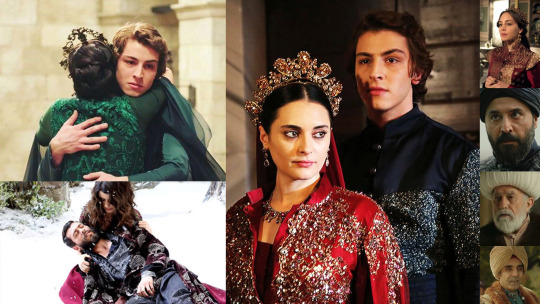
Chaos
Mustafa I was followed on the throne by Osman II who aroused the hatred of the soldiers, so he soon had to face with a rebellion. The Janissary rebellion was said to have been fueled by Halime and Kösem. It is more likely, however, that Halime only took advantage of the anger of the Janissaries, perhaps financially supporting them, but it is almost out of the question that she or Kösem was behind the rebellion. For Osman worked hard to get the Janissaries to rise up against him. Either way, the Janissaries broke into Topkapi Palace, freed Mustafa I who was living in confinement, and then brought his mother out of the Old Palace and took them to the Janissaries Mosque. There Mustafa was again proclaimed sultan in May 1622.
On behalf of Mustafa, Halime, working with the Janissaries, chose a Grand Vizier in the person of Kara Davud Pasha. They also had to decide the fate of Osman. According to a source based on an eyewitness account, Janissary officials simply wanted to close up the sultan to the kafes, but Halime convinced them that if they did not get rid of him here and now, Osman would overtake them and execute them all. Halime probably guessed it well. Davud Pasha soon appeared with a rope, but the Janissary leaders did not allow him to execute Osman in the mosque, even as Halime had demanded. Eventually, after a long torture and humiliation, the former Sultan was taken to the Yedikule prison with Davud’s men. Halime made a huge mistake here, for Osman was extremely humiliated and then tortured before he was killed and mutilated. The evidence does not rule out the possibility that Halime gave this order. Others say Davud Pasha was behind Osman's brutal execution because of private reasons. Either way, the execution of a former sultan in this way could not go unpunished.
Davud Pasha could not enjoy the rank of Grand Vizier for long as Halime named Davud Pasha responsible for the brutal execution of Osman, to save herself and her son from the wrath of the people, pashas, some military units, and Seyhülislam. Davud was soon executed for this. With his death, Halime lost her biggest supporter. Most statesmen, soldiers, and the common people were reluctant to see the mad sultan on the throne, and they did not trust Halime either, so the situation of Halime and Mustafa soon became worrying again.

Last exile
Erzurum’s beylerbey, Abaza Mehmed Pasha, marched to Istanbul to take revenge for the murder of Osman, and most of the statesmen also shared his views. It is not excluded that Kösem Sultan was already on the side of the Janissaries at that time. Eventually, Halime was offered to test the Sultan’s capability with two simple questions and if he can answer, everything could go on, but if not, their rule would end. Halime, finally knowing her son's condition, did not agree to the test, but resigned herself with the stipulation that in return Mustafa's life would be spared. Everyone agreed to this, so Mustafa was locked up again.
In September 1623, Halime left the Topkapi Palace permanently and returned to the Old Palace, this time forever. It is not known when and how she died, for she was expelled from public life for her role in the execution of Osman. She must have died in the Old Palace, alone or with her daughter along her side, forgotten. She rests next to her son in Aya Sofya. Her burial place suggests that she may survived Mustafa, so she died after 1639. Halime was the only woman in the history of the Ottoman Empire who could have been Valide Sultan twice to the same Sultan.

Used sources: C. Finkel - Osman's Dream: The Story of the Ottoman Empire; L. Peirce - The imperial harem; M. P. Pedani - Safiye's household and Venetian diplomacy; G. Börekçi - Factions and favourites at the courts of Sultan Ahmed I (r. 1603-17) and his immediate predecessors; Necdet Sakaoğlu - Bu Mülkün Kadın Sultanları; G. Börekçi - A Queen Mother at Work: On Handan Sultan and Her Regency during the Early Reign of Ahmed I
* * *
Eredete és a korai évek
Haliméról tudjuk talán a legkevesebbet a Nők szultánátusának összes női karaktere közül. Általában abkháziai nőként hivatkoznak rá, de előfordul a cserkesz eredet is. Az azonban bizonyosnak tűnik, hogy a Kaukázusból származik. Születési idejére gyermekei születéséből következtethetünk, eszerint nagyjából 1570 körül születhetett. Nem tudni hogyan és ki által került Mehmed herceg háremébe. A maniszai háremben Mehmed figyelmét megosztotta Halime és egy másik ágyas, Handan között. Ezek az évek relatíve nyugalomban teltek, hiszen Mehmed édesanyja, Safiye nem tartózkodott Maniszában.
Halimének legalább négy gyermeke született. Legidősebb fia Mahmud 1587-ben jött világra, legkisebb fia, Musztafa pedig jóval Mehmed trónralépése után, 1600 vagy 1601 körül. Mellettük volt még két lánya, Hatice és egy másik lány, akinek neve nem maradt fenn, talán Şah szultánának hívták és akik nagyjából akkortájt születtek, amikor Mahmud. Mellettük talán Cihangir herceg is az ő fia volt, aki az 1590-es évek végén született és 1602-ben hunyt el. Halime gyermekeinek száma sugallja, hogy Mehmed igen kedvelhette a nőt, különös tekintettel arra, hogy legkisebb és legnagyobb gyermekeinek születése között majd 15 év telt el.
A szultán ágyasa
Mehmed 1595-ben trónra lépett, háreme pedig követte őt Isztambulba. Békés maniszai éveiknek itt vége szakadt, a Topkapi Palota háremét ugyanis erős kézzel irányította Mehmed anyja, Safiye. Safiye megtiltotta fiának, hogy bármelyik ágyasának Haszeki rangot adjon, hogy ezzel elkerülje politikai befolyásukat. Rangtól függetlenül azonban valószínű, hogy Halime befolyásolni tudta Mehmedet, ugyanis Safiye igen féltékeny volt a nőre a követi beszámolók alapján. Viszonyuk az idő előrehaladásával fokozatosan romlott, ám amíg életben volt a fő eunuch Gazanfer Aga viszonylag képes volt rendet tartani a háremben. Halálával azonban elszabadult a pokol és a hárem két részre szakadt: Safiye szultána és Handan támogatóira, akik Handan fiát, Ahmedet támogatták és Halime támogatóira, akik Halime legidősebb fiát, Mahmudot. Safiye és Handan támogatottsága a háremen belül nem volt kérdéses, azonban a háremen kívül Halime fia volt a favorit. Handan szultána, hogy minél több támogatót szerezzen azt kezdte el terjeszteni Mahmudról a háremen belül, hogy impotens és nem fog tudni gyermeket nemzeni trónralépése esetén sem. A pletyka végül a divanba is bejutott, ahol egyébként szintén igen megosztó kérdés volt a két herceg támogatottsága.
Mahmud herceg igen meggondolatlan volt, apjával többször viselkedett tiszteletlenül. Ilyen alkalom volt, mikor nyíltan követelte apjától, hogy az adjon neki hadsereget, amellyel legyőzheti az apja ellen lázadó Celalikat; máskor pedig azzal bosszantotta apját, hogy állandóan faggatta, mikor kap végre tartományt. Mahmud szinte esztelen lelkesedésének oka nem világos, de talán az a tény, hogy anyja volt Mehmed szultán kedvence tovább tüzelte a herceget, azt gondolván, hogy bármit megtehet. Ismerve Mahmud cselekedeteit hiba lenne azt gondolnunk, hogy Halimének nem volt felelőssége ebben, hiszen a hercegek nevelése elsődlegesen az anyjuk feladata volt. Sőt egyes források szerint maga Halime is igyekezett meggyőzni Mehmedet, hogy küldje végre tartományba Mahmudot és nevezze meg őt, mint örökösét.

A végzetes hiba
Halime 1603-ban, ismerve fia támogatottságát, ismerve Safiye ellenérzéseit irányukba, levelet küldött egy látnoknak, hogy megtudakolja, fia fog e az Oszmán trónra ülni. A válaszlevelet pedig természetesen nem Halime, hanem Safiye kaparintotta meg, aki azonnal Mehmedhez sietett vele. A levélben azt írták, hogy a szultán fél éven belül meg fog halni és igen, Halime fia lesz a szultán. Ez már önmagában elég lett volna a halálos ítélethez, ám volt még más is. Hónapok óta terjengtek olyan pletykák, hogy Mahmud és Halime szövetkezik a lázadó szpáhikkal és janicsárokkal, hogy megmérgezzék a szultánt és Safiyét. A levél és a pletyka együtt már túl sok volt. Különös tekintettel arra, hogy Mahmud maga többször nyíltan beszélt nagyanyja, Safiye szultána ellen, hangoztatva, hogy a nagymama bábként mozgatva a szultánt csak árt a birodalomnak. Ismerve tehát Mahmud természetét, ellenérzéseit nagyanyja iránt és támogatottságát a lázadók körében, és olvasva a levelet Mahmud sorsa megpecsételődött. Na de bűnös volt e Mahmud?
Nem maradt fenn olyan bizonyíték amely arra utalna, hogy Mahmud és Halime valóban lázadást akartak volna szítani a szultán ellen. Az egyetlen bizonyíték, néhány szolgálójuk vallomása. Ezeket a vallomásokat azonban több napi kínzás után adták a szolgálók, így talán nem feltétlenül lehetünk biztosak valódiságukban. A kínzások után pedig minden szolgálót és eunuchot, akik Safiye és Handan ellen voltak kivégeztettek. Mahmudot is napokig kínozták, hogy bevallja bűneit, ám nem vallott, hiszen minden bizonnyal ártatlan volt az árulásban. Azonban nem ítélhetjük el egyértelműen Safiyét és Mehmedet. Mehmed ellen három év alatt három felkelés zajlott, fia pedig igen meggondolatlanul cselekedett és nyilatkozott, így összességében valószínűleg a körülmények áldozata lett. Végül 1603. júnus 7-én Mahmud herceget megfojtották. A követek szerint a halálbüntetés mögött nem annyira Mehmed, mint inkább Safiye szultána álltak.
Évszázadokon keresztül úgy hitték, hogy Mahmuddal együtt édesanyját is kivégezték. Azonban nemrégiben előkerültek olyan követi beszámolók, amelyek tisztázzák a helyzetet. Contarini először maga is arról számolt be, hogy a herceg anyját kivégezték, azonban részletesen utánajárt az eseményeknek, informátorai egyenesen a palotából származtak, így teljesen magabiztosan írta azt, hogy a herceg anyjának megkegyelmeztek legkisebb fia, Musztafa kedvéért, ezért csak száműzték a Régi Palotába. Egyesek szerint Musztafa is vele tartott a Régi Palotába, mert túl kicsi volt, hogy elválasszák az anyjától. Mások szerint Musztafa innentől kezdve elzárva élt egy dajkával.

Újabb rettegés
Mehmed szultán valóban néhány hónapon belül elhunyt egy hirtelen szívrohamba és Handan fia, Ahmed követte a trónon. Ahmed tizenhárom éves volt, nem volt körülmetélve, így a dinasztia jövője kérdéses volt. Halime rettenetesen aggódhatott fia, Musztafa életéért, hiszen a törvény jól ismert volt: a trónralépő szultánnak a rend fenntartása érdekében ki kell végeztetnie öccseit. Handan szultána végül az államférfiak támogatásával azt javasolta, hogy a kis Musztafa herceget ne öljék meg Ahmed trónralépésével, hiszen szükség van minden lehetséges trónörökösre. Ezzel a döntéssel tulajdonképpen a testvérgyilkosság évszázados hagyományát szegték meg. Mindenesetre Musztafát elválasztották Halimétől, és egy dajkával élte mindennapjait, de Handan szultána is rendszeresen figyelt a gyermekre.
Halime nem lehetett azonban teljesen nyugodt Ahmed döntése után sem, hiszen amint Ahmednek megszülettek első gyermekei 1604-ben és 1605-ben újra terítékre került Musztafa kivégzése. Valójában Ahmed háromszor küldött hóhérokat Musztafa herceg lakrészébe, ám végül mindig meggondolta magát és nem tudta testvére életét elvenni. Halime így lassan fellélegezhetett, igaz távol kellett lennie fiától - nem tudjuk, hogy egyáltalán alkalmanként találkozhatott e vele - de legalább fia életben volt. Musztafa életben hagyásában egyesek szerint mentális állapota is közre játszott. Sokak szerint ugyanis már gyermekként gyengeelméjű és epilepsziás volt, így nem tartották valós fenyegetésnek.
Nyugalmas évek
Halime bár Ahmed uralkodása alatt végig a Régi Palotában élt száműzetésben, fia életéért egy ponton túl nem kellett aggódjon és lányai élete is sínen volt. Ahmed ugyanis nemsokkal trónralépése után kiházasította testvéreit. Halime lánya, Hatice 1604-ben Mirahor Mustafa Pasa felesége lett, majd 1612-ben Cigalazade Mahmud Pasához adták nőül, azonban az esküvő után nemsokkal elhunyt. Másik lánya, akit talán Şah-nak hívtak szintén Ahmed által lett kiházasítva ugyancsak 1604-ben vag 1605-ben Kara Davud Pasához. A pasa 1623-as halála után a szultána is eltűnt a feljegyzésekből, talán meghalt, talán száműzeték a közéletből.
Nem valószínű, hogy Halime politikailag vagy bármilyen más módon aktív lett volna Ahmed uralkodása alatt, ugyanis egyáltalán soha, senki még csak említést sem tett róla. Minden bizonnyal nyugalmasan, minden mozdulatára odafigyelve élt a Régi Palotába. Lányai valószínűleg látogathatták, hiszen általában az anya száműzetésekor a lányai is követték őt, mint ahogy korábban Safiye esetében is történt.

Az új kezdet
Halime élete fenekestül felfordult 1617 novemberében, mikor is Ahmed szultán egy betegség miatt viszonylag hirtelen és fiatalon elhalálozott. Bár maga sosem bántotta öccsét, nem rendelkezett arról, hogy az öröklés módosul e. Halála után végül az államférfiak és vallási vezetők összeültek és megvitatták a kérdést. Arra a döntésre jutottak, hogy a testvérgyilkosság törvényének ideje lejárt és új öröklési sorrend szükséges. Úgy határoztak, hogy a legidősebb és legalkalmasabb herceg fogja követni a szultánt, nem pedig apáról fiúra fog történni az öröklés. Azonban Ahmed halálakor a legidősebb herceg, Musztafa mentális állapota miatt volt alkalmatlan, a második legidősebb herceg pedig csak 13 éves volt, így kora miatt volt alkalmatlan. Végüls a fő eunuch, Haci Musztafa Aga és a Seyhülislam Esad Efendi nyomására úgy döntöttek, hogy Musztafát ültetik a trónra. Azt remélték, mentális problémái csak a bezártságnak tulajdoníthatók és amint elkezd emberekkel érintkezni, rendbe jön.
Halime tehát visszatérhetett a Régi Palotából, tizennégy évvel száműzetése és legidősebb fia halála után, ezúttal Valide Szultánaként. És nem csak a Valide feladataiért volt felelős, de Musztafa mentális állapota miatt régensi feladatokat is el kellett látnia. Halime a vezírekkel együttműködve uralkodott, az egyetlen vitatható lépése az volt, hogy saját maga számára 3000 asperes napi fizetést határozott meg, ami bőven meghaladta Safiye korábbi fizetését. Halime igen fontos támogatóra talált vejében, Kara Davud Pasában, azonban nem volt ideje a pasát nagyvezírré tenni. Musztafa állapota ugyanis elég aggasztó volt, bár sosem bántott senkit és viszonylag könnyen kordában tudták tartani, mindenki számára világossá vált, hogy mentálisan súlyosan zavart a szultán. Emiatt 1618-ban trónfosztották és visszazárták lakrészébe, Halimét pedig újra a Régi Palotába küldték, ám megadva neki minden validének kijáró tiszteletet. Visszavonulása után is extrém magas, 2000 asperes napi fizetést kapott.

A káosz
Musztafát II. Oszmán követte a trónon, aki kiváltotta a katonák gyűlöletét, így hamarosan lázadással kellett szembenéznie. A janicsár-lázadást egyesek szerint Halime szultána és Köszem szultána szította. Valószínűbb azonban, hogy Halime csak kihasználta a janicsárok dühét, talán anyagilag támogatta őket, de szinte kizárt, hogy ő vagy Köszem állt volna a lázadás mögött. Oszmán ugyanis bőven megdolgozott azért, hogy a janicsárok felkeljenek ellene. Akárhogyan is, a janicsárok betörtek a Topkapi Palotába, kiszabadították az elzárásban élő Musztafát, majd édesanyját is elhozták a Régi Palotából és a janicsárok mecsetjébe vitték őket. Ott Musztafát újra szultánná kiáltották ki 1622 májusában.
Musztafa nevében Halime szultána pedig a janicsárokkal együtt működve nagyvezírt választott, Kara Davud Pasa személyében. Emellett dönteniük kellett Oszmán sorsáról is. Egy szemtanú beszámolójára alapozott forrás szerint a janicsár tisztviselők csupán elzárni akarták a szultánt, Halime azonban meggyőzte őket arról, hogy ha itt és most nem szabadulnak meg tőle, akkor Oszmán felül fog kerekedni rajtuk és mindannyiukat kivégezteti. Halime ezt alighanem jól sejtette. Davud Pasa hamarosan egy zsineggel jelent meg, ám a janicsár vezetők nem engedték meg neki, hogy a mecsetben végezzen Oszmánnal még úgy sem, hogy Halime is ezt követelte. Végül a szultánt hosszas tortúra és megalázás után a Yedikule börtönbe vitte át Davud embereivel. Halime szultána itt hatalmas hibát követett el. Oszmánt ugyanis rendkívüli módon megalázták, majd megkínozták mielőtt meggyilkolták és megcsonkították volna. A bizonyítékok alapján nem zárható ki, hogy Halime adta erre a parancsot. Mások szerint Davud Pasa állt Oszmán brutális kivégzése mögött. Akárhogy is, egy volt szultán ilyen módon történő kivégzése nem maradhatott büntetlenül.
Davud Pasa nem élvezhette sokáig a nagyvezíri rangot, Halime szultána, hogy magát és fiát mentse a nép, pasák, néhány katonai alakulat és Seyhülislam haragjától, Davud Pasát nevezte meg felelősnek Oszmán brutális kivégzéséért. Davudot emiatt hamarosan kivégezték. Halálával Halime elvesztette legnagyobb támogatóját. A legtöbb államférfi, katona és a köznép sem látta szívesen az őrült szultánt a trónon és Halimében sem bíztak, így hamarosan újra aggasztóvá vált Halime és Musztafa helyzete.

Utolsó száműzetés
Erzurum beglerbégje, Abaza Mehmed Pasa Isztambulba masírozott, hogy boszút álljon Oszmán meggyilkolásáért és az államférfiak nagyrésze is osztotta nézeteit. Nem kizárt, hogy a janicsárok oldalán ekkor már Köszem szultána is beszállt a harcokba. Végül Halimének felajánlották, hogy tesztelni fogják a szultán alkalmasságát két egyszerű kérdéssel és ha alkalmasnak találják, minden mehet tovább, de ha nem akkor vége lesz az urlakodásuknak. Halime végül ismerve fia állapotát nem egyezett bele ebbe, hanem magától lemondott azzal a kikötéssel, hogy cserébe megkímélik Musztafa életét. Ebbe mindenki beleegyezett, így Musztafát újra elzárták.
1623 szeptemberében Halime végleg elhagyta a Topkapi Palotát és újra visszatért a Régi Palotába, ezúttal véglegesen. Nem tudni, hogy mikor és hogyan halt meg, Oszmán kivégzésében játszott szerepéért ugyanis kizárták a közéletből. Minden bizonnyal a Régi Palotában halt meg, elfeledetten. Fia mellett nyugszik az Aya Sofyában. Temetésének helye arra utal, hogy talán túlélte fiát, így 1639 után hunyhatott el. Halime volt az Oszmán Birodalom történetében az egyetlen nő, aki kétszer lehetett Valide Szultána ugyanazon szultán mellett.

Felhasznált források: C. Finkel - Osman's Dream: The Story of the Ottoman Empire; L. Peirce - The imperial harem; M. P. Pedani - Safiye's household and Venetian diplomacy; G. Börekçi - Factions and favourites at the courts of Sultan Ahmed I (r. 1603-17) and his immediate predecessors; Necdet Sakaoğlu - Bu Mülkün Kadın Sultanları; G. Börekçi - A Queen Mother at Work: On Handan Sultan and Her Regency during the Early Reign of Ahmed I
40 notes
·
View notes
Text
In All Things 21/?

Mr. Gold/BelleFrench, Explicit (eventually)
Summary: A Rumbelle arranged marriage AU.
Chapter Summary: A confrontation between friends, and a fireside chat.
Notes: For my August Writer's Month prompt #3: I couldn't sleep. I hope this makes up for the way the previous chapter ended. Here there be the start of FEELINGS.
[AO3]
“You’re grumpy.”
Gold glared at Jefferson over the edge of his book. “I am not.”
Jefferson let out a soft snort and shook his head as he moved into the room. Gold was sitting in one of the high back chairs in front of the fireplace, his right foot propped up on a short footstool.
“You are,” Jefferson said. “And you’ve no right to be.”
Gold lowered his book to his lap and openly scowled. “You are fortunate that you are not just my steward but also my only friend.”
Jefferson laughed and took the chair opposite Gold, arranging himself rather haphazardly, with one leg slung over the arm as he lounged across it. His action drew another look from Gold, as he’d designed it to do. He had decided that Cameron Gold needed to be needled a little given his petulant behavior yesterday.
“I’m not your only friend,” he said. “You have Belle too.”
Gold sighed. “I suppose.”
After he saw Belle and Jefferson together, he’d gone off to find Astrid, intent on finding out what had shocked her so that she’d hurried off without even looking where she was going. He found her in the kitchens a few minutes later, and she admitted everything to him. He had to admit he’d been surprised as well, and immediately stormed off to his room to think on the matter.
Belle had kissed Jefferson.
Of course to Astrid this was an event imbued with some great importance and intent, but once he’d had a chance to question the maid again, she gave him further information which dispelled all that. It had been a simple kiss on the cheek, one friend to another, and he was certain it was meant as nothing more than a moment of care and understanding. Yet it had bothered him nonetheless, and he had ruminated over it for the last day or so, eschewing last night’s supper and this morning’s breakfast with the rest of the household in favor of eating alone in his study. He knew he couldn’t avoid Belle forever, nor did he want to, but his immediate reaction to the incident unsettled him.
Belle and Jefferson becoming friends was hardly astonishing. They were both kind, outgoing people with mutual interests and dispositions. It was only natural they should gravitate towards each other. Yet Gold had felt the oddest pang at the thought of there being more between them. The notion that his wife, though their marriage was strictly a legal and financial arrangement, not anything romantic or familial, would favor another over him, that she might care for another, had left him disconcerted.
He thought that he and Belle had bonded while in Avonlea, and started to build a kind of partnership in the running of the estate in addition to their burgeoning friendship. While that was still a possibility, it seemed she was already far closer with Jefferson than he had understood, enough that she had confided in him regarding her relationship with Gaston. Perhaps it was that fact that disturbed him? A confession of something held so close that even her own father didn’t know the whole of it, belied an intimacy and trust that Gold only now realized he envied.
Jefferson huffed and sat up, putting his feet on the floor and facing Gold. “You’re an idiot.”
Gold was shaking from his thoughts and frowned. “Am I?” The other man’s look conveyed everything, and he closed the book and set it aside. “Yes, I suppose I am.”
“It’s not her fault.”
“I - I never said it was, did I?” he asked, slipping his foot from the small ottoman and leaning forward. “And what are you talking about anyway?”
Jefferson shook his head. Things had clearly not improved with his mood since last night when they had discussed the particulars of what transpired between Belle and Gaston. “Belle," he replied. "Telling me about Gaston is not her fault, and it’s not some slight on you.”
“I never said it was!” Gold pulled a face and pushed to his feet, pacing across the rug. “She can tell whomever she likes whatever she likes. It is of no consequence to me.”
“Right.” Jefferson waited for Gold to reach the end of his short walk and turn around before fixing him with a look. “It’s clearly not bothering you at all, that’s why you’ve acted like a child and flounced off to your room for a whole day.”
“I did not flounce,” he snapped, clearly affronted.
Jefferson hummed and rolled his eyes to the side. “All I did was ask her, you know. Just asked her what happened. She wanted to talk about it.”
Gold looked away, his response muttered under his breath, but still loud enough for his friend to hear. “To you perhaps.”
“To you as well!” Jefferson stood and crossed the space, forcing Gold to look at him. “But you don’t ask. You never do.”
“Yes, well,” he said softly. “Not everyone is an open book like you.”
“Neither is Belle.” Jefferson reached for Gold, and put a reassuring hand on his shoulder. “She lost her mother, nearly lost her home, and then this - this incident with Gaston... “
Gold turned, shrugging off Jefferson’s touch, and faced him. “What would you have me do? She said she trusted me, and then she tells you instead.”
He huffed and walked over to the window, sighing at the cool draft against his skin.
“You’re jealous.”
He scowled over his shoulder. “Hardly.”
Jefferson flashed his teeth. “Oh, you are, my friend. You like her.”
“Jefferson...” he warned.
He felt a hand on his shoulder again as Jefferson leaned in close.
“She might like you too if you just tried a little harder.”
Gold scoffed and folded his arms, gazing out the window at the winter landscape that his gardens had become. When he exhaled, his breath created a circle of fog on the glass, that faded a moment later. “We both know I’m a difficult man to love.”
“Only because you make yourself so.” Gold huffed again, and Jefferson’s head cocked to the side. Then he suddenly leaned in and planted a firm, wet kiss on Gold’s cheek.
Gold exclaimed and raised his arm, pushing his friend back to peels of laughter, and then wiped his face roughly with his palm. He shot a glare at Jefferson and then shook his head. “Get out.”
Jefferson grinned, still chuckling to himself. “Only if you promise to talk to Belle.”
“Yes, yes,” he replied, waving the other man off.
He doubted very much that Belle could ever care for him in that way, even if he determined his own feelings were heading in that direction. But that was something he could not allow; it would only complicate matters and possibly derail some of his plans altogether. He wanted a friendship with Belle, nothing more, though he’d been prepared at the outset for her to reject any interaction with him beyond what was necessary for Baeden. Emotional entanglement had been an outside risk in marrying again, one he’d chosen to ignore because of the unlikeliness of such a situation ever occurring.
Then he’d heard about the state Avonlea was in, and about Lady Belle’s abruptly broken engagement. He knew there had to be some kind of secret there, another risk he’d been willing to take for the sake of his son. Tomorrow, he would go down to breakfast and invite Belle to review Avonlea’s ledgers with him again, to get a sense of what she thought might be best. If she agreed, he would use the opportunity to broach the subject of Gaston with her, and perhaps it would set his mind to rights.
The door closed softly as Jefferson left the study, but Gold didn’t move from his spot by the window for some time.
Belle leaned her forehead against the cold glass, the frost at the corners prickling her skin, and sighed.
It was the first heavy snow of winter, with a wind that blew the fat, wet flakes at a sharp angle, illuminated by the light from the oil lamps that lined the edge of the walkways out into the garden, and sparkling. In the morning, one side of the trees would be frozen, coated in ice and bent in the direction of the storm, their branches dipping almost to the ground by the weight of the snow.
Tomorrow was the Solstice, the longest, darkest day of the year. In the evening, the cities, towns, and villages all over the kingdom, and beyond, would celebrate with festivals beginning at sundown. She had loved the grand galas that her mother would throw at Avonlea, the smell of pine and spice wafting through the manor in the days leading up to the feast. Every noble from the surrounding area was invited, and there would be hours of dancing and drinking and eating. Many times she went to bed before it was even half over, the faint sounds of strings and laughter drifting into her dreams.
She wondered what it would be like here at Thornhill. There were few other nobility this far north, and only two small villages. Much of the land Gold owned was for farming and raising sheep rather than renting to wealthy merchants. She supposed it was one reason why it thrived even in the lean times, whereas other estates like Avonlea, that rented parcels to wealthy families to build their own, smaller estates, and only as much for farming as was needed, struggled to get by.
The celebration tomorrow, if there was one, would likely be a much smaller affair than she was used to, but she thought that this year it would suit her to keep things more subdued. The strife of the last few months had worn on her, and she didn’t feel very celebratory. Perhaps there could be some dancing though, if she could persuade Jefferson to play something. The thought made her smile.
Jefferson had become a dear friend to her in a short time. Telling him some of what happened with Gaston had made her feel immeasurably better, though what happened after seemed to leave them both uncomfortable. Astrid meant well, Belle was sure, but the woman could be so excitable, and often confused things when she was in that state. Whatever the maid had said to Gold upset him enough that he avoided both Jefferson and her for the rest of the evening. He even took breakfast in his room, which in turn upset Bae.
It had been a long day, but after nearly an hour of trying and failing to fall asleep, she’d climbed out of bed and brought her book to the window seat in her library. Nestled there with a thick afghan and wool socks, she couldn’t get cozy enough to rest, and besides that her mind seemed intent on being unsettled. It would probably remain so until she could sort out things with Gold.
She trusted him enough to tell him more of what occurred with Gaston, more than she’d told Jefferson, but she was uncertain of how he might take it. Jefferson believed that Gaston had tried to hurt her, and felt her actions were more than justified, but she knew not everyone would agree. She didn’t know which side Gold would choose, and worried that his more exacting nature might override his good will towards her.
Frustrated and chilled, Belle closed her book, and climbed down from the seat. She wrapped the blanket around her shoulders and let it trail behind her like a long cloak as she made her way downstairs to the main library room, hoping to find a warmer, cozier place to read until she felt tired enough to sleep.
The library doors were closed for the evening, but she eased one of the open and slipped quietly inside. Turning around, she stopped and held the afghan closer, pressing her book against her chest. Gold was sitting by the fire in one of the large leather chairs, a book folded open on his knee as he stared into the fire.
She shuffled forward, but when he didn’t move or acknowledge her presence she let out a small cough. He startled at that and twisted in the chair. The fire and two candelabras were the only light in the room, but she could see his eyes were dark and wide with surprise.
“Belle,” he said softly.
A shiver went down her spine, and she held the blanket tight to her body.
“What are you doing up at this hour?” he managed, trying not to consider the fact that she was in her nightgown and stockings, covered in nothing but a knit blanket.
“I couldn’t sleep,” she said. “You?”
He shrugged. “The same, but that’s nothing new.” Then he gestured to the other chair, and she spied a small glass in his hand, a dark liquid swirling about and catching the shine of the fire. “Would you care to join me for a late night drink, and a stare into the fire until we uncover the secrets of life?”
His tone was playful and soft, and she laughed lightly. “Yes, thank you.”
She set her book on the small table between them, and eased herself into the seat, adjusting the afghan so it was folded over her lap and wrapped around to keep her arms covered. To do so she had to expose the front part of her nightgown where it laced up over her chest, but she was near enough to the fire that she didn’t feel a chill.
Gold rose and crossed to a small cart set to one side of the fireplace and poured her a glass of brandy from a crystal decanter. She watched as he moved, taking in his unusual appearance. He was wearing one of his ivory shirts, but without a waistcoat or ascot, and wearing a comfortable pair of slippers instead of his usual high laced boots. She had never seen him in so few layers of clothing. It made the moment feel more intimate than it should.
When he turned around, drink in hand, she noticed that not only had he gone without his usual neckwear, but he’d also undone the top of his shirt, letting the laces hang down the front. It was only just untied, and there was little beyond a sliver of skin showing, but she caught herself staring all the same.
Gold met her gaze as he bent to hand her the glass. His eyes looked so warm, the glow of the fire reflecting in them, and she held back another shiver as she took the drink from him. He moved to sit, and she hastily took a sip of the brandy, humming as the heat trailed down her throat.
“Good?” he asked quietly.
She nodded and lowered the glass to her lap. “Perfect.”
He flashed her a small smile, and sat back against the chair, sipping from his own drink. A few minutes ago, he’d nearly gathered himself up and forced himself to go to bed, but now he was content to stay as long as Belle in the hopes that he might have a chance to gage her thoughts on yesterday’s misunderstanding.
She was wearing a pale blue nightgown with long sleeves that laced up the front. It was a struggle to keep his eyes from taking her in, but he focused them on the dancing flames in the hearth. He had seen her in a similar state barely a week and two days ago in Avonlea, after he’d hauled her in from the snow. When he returned to her room she was fresh out of her bath, her skin pink from the heat of the water, which looked far better on her than the sickly pale from being wet through and nearly frozen.
It was the first time he’d allowed himself to acknowledge her beauty, though he’d been struck by it the moment he first saw her, standing under the arbor in the garden before she came down the aisle to marry him. Such a moment it had been. He felt as though he’d gaped at her the whole way, and considered it a miracle that he managed not to blunder any of his lines. But seeing her like this, in the late hours of the evening, padding around his house in her warmest stockings, with an afghan he’d knitted himself so many years ago - it pulled at something in him. He tried to push the feeling down, but it wouldn’t relent, warming him from the inside better than the brandy.
“So,” Belle said after a time. “Have you discerned anything yet?”
Gold’s lips curved slightly as he lifted his glass. “Nothing. You?”
She sighed. “The same, I’m afraid. Perhaps the universe does not wish to reveal its wonders to us just yet.”
He let out a sound of agreement and swallowed the drink in his mouth.
“I want you to know,” she said, “that what happened with Jefferson was not what it seemed.”
He frowned. “I didn’t think it seemed like anything.”
She looked at him sideways, and sipped carefully at her drink. “You haven’t been avoiding me because of it?”
“No,” he replied. It wasn’t a lie. He’d been avoiding her because of himself, though how to say that properly was lost on him. “It - it wasn’t anything you did. You have every right to whatever affection you may have for Jefferson.”
“It’s not like that,” she said. “He’s a good friend, that is all.”
Gold waved a hand and set his glass on the table. “No matter. You should feel free to do as you wish. It isn’t as if I have any sort of claim on you.”
Belle’s mouth opened and then closed as she idly turned the drink in her hand. What he said wasn’t entirely true. She did have an affection for Jefferson, but it was as nothing more than a good friend. She was sure it was the same for Jefferson as well, but she had come to realize that there was now a place in her heart for Bae as well as Gold.
“Did Jefferson tell you -?”
“What you told him?” he asked, shifting in his chair to look at her more directly. “Yes, he did.”
She nodded and looked down at the last little puddle of brandy in her glass. Jefferson had sworn himself to the strictest secrecy, but she assured him that there was no need for that with Gold. She wanted him to know as well. “Good.”
“I’ll remember never to anger you,” he added, smiling. “Wouldn’t want to be on the wrong end of things.”
When she looked over at him, he winked at her, and she let out a soft, snorting laugh. The brandy had loosened her tongue and his, and they shared a grin and a chuckle at Gaston’s expense. She felt lighter again, the same as after she had confessed to Jefferson, and now she knew that Cameron did not hold anything against her.
She tossed back the last of her drink and set the glass aside, surprised and how her mind had suddenly shifted from thinking of him as Gold to thinking of him more familiarly. It was as if the distance he had put between them had meant a loss of the friendly intimacy they had established. Now that things seemed resolved, she had shifted easily to reclaim it and in doing also found her comfort again. Her body felt more relaxed and warm, and she felt that perhaps now she might be able to sleep, but there was something about this moment that she was loathe to end.
“I’m sure you won’t be,” she said finally.
He scoffed quietly and leaned his head back. “Oh, I wouldn't count on it. I can be - difficult.”
“You don’t say,” she replied flatly.
Immediately Gold twisted in his seat to stare at her open mouthed and wide eyed. She pressed her lips together even as her mouth started to curve, and after a few seconds, they both laughed.
Belle knew she was definitely tired enough to rest, and slowly pushed to her feet. “Thank you.”
“For what?”
He looked up at her, and once again she caught the flash of the fire in his dark eyes, and felt an odd tightness in her throat. “For - for the drink,” she answered, reaching for his hand where it rested on the arm of the chair. “And - and for other things.”
She wrapped her hand over his and held it at her side, his knuckles brushing against the soft yarn of the blanket where it hung loose around her legs. He gave her a light squeeze and brushed his thumb over the bump on the outside of her wrist.
“Are you -” He started and then stopped, clearing his throat roughly and swallowing against the lump that had formed there. “Are you happy here, Belle?”
He met her eyes, and for a brief second, he thought he might have almost unlocked one of the secrets they had joked about before, as though the universe might lay itself bare in her gaze if only he was brave enough to look at it. Shaking his head, he looked away and made to pull his hand back, but she gripped it harder, tugging to make him look at her again.
“I’m not - unhappy,” she said, smiling. “And you?”
“The same.” Then he shook his head again and pulled her hand to him, pressing a kiss to the back of it as had become his habit. “Good night, Belle.”
On a whim, she bent down, catching herself with her free hand on the arm of his chair and kissed his cheek. Her body angled over his, nightgown brushing his clothes, and her lips touched just to the right of his mouth, lingering a moment before she straightened. “Good night, Cameron.”
It was another hour before Gold went to bed.
#rumbelle#rumbelle fic#belle x mr. gold#arranged marriage au#in all things#my rumbelle fic#lindsay's august writer's month 2020#fic
22 notes
·
View notes
Text
The 12 Days Of Cookiemas: Holiday Pastries From Around The World
There’s something about the holidays that make cookies an inevitability. As the temperatures dip down, baking cookies is an excuse to turn on the oven and fill the kitchen with both warmth and the smells of vanilla and cinnamon. Cookies are a great way to feed gatherings of people, without the need for cutting or slicing. And as the evenings get darker and we start to stay inside more, they’re a welcome escape. Traditional Christmas cookies are nostalgia wrapped in sugar.
Another great thing about cookies is how varied they can be. It’s tempting to always stick with the same pastries your parents made, but that limits your possibilities. To help you diversify, we looked at some of the most popular cookies in other countries. Presenting the 12 Days of Cookiemas, with recipes for traditional Christmas cookies from around the world.
1. German Pfeffernusse

Pfeffernusse are very popular throughout Germany and the Netherlands during the holiday season. The name literally means “pepper nuts,” which sounds far less appealing than they actually are. They’re similar to gingerbread, but thicker, softer and covered with a firm sugar icing. The snowball appearance gives them an extra wintery look. You can buy them in many stores in the United States, but nothing beats the homemade kind.
2. Argentinian Alfajores

Alfajores are kind of like Oreos, but also they’re nothing like Oreos. These pastries are two soft cookies held together by dulce de leche, and the combination is delicious. The origins of this cookie apparently go back to Spain over 1,000 years ago, when a slightly more rudimentary form of the pastry was made. The recipe traveled to South America during the colonial era, and they were really perfected in Argentina.
3. Polish Kołaczki

Photo by Kurman Communications, Inc. via Flickr. License.
Perhaps the greatest feature of kołaczki is that they’re very versatile. The exterior is constant — a cream cheese dough with a nice flakiness — but the inside can be whatever you’d like. Whether filled with almond spread, strawberry or even Nutella, kołaczki are a delicious cookie. Poland, the Czech Republic and other countries all claim to have invented this pastry, but its exact origin is lost to history. You don’t need to know where they’re from to eat them, though.
4. British Stained Glass Cookies

Don’t worry, there’s no actual glass in stained glass cookies. It’s essentially a sugar cookie with holes cut into it, where you add crushed candy that’s heated to turns into a “pane.” So it’s literally a candy window. These cookies are great to eat, but they’re also used for another purpose: decoration. You can put a hole near the top and put string through them. Some people hang them on their Christmas trees or in their windows. Of course, you can also just eat them, because some people might think it’s weird to have stale cookies hanging around your house.
5. Eastern European Rugelach

Rugelach, traditionally a Jewish pastry, is not explicitly associated with any holiday. Yet it seems that as December rolls around, these cookies start to appear. They often makes an appearance at holiday parties, regardless of the host’s religious affiliation. They’re kind of like mini croissants, with dough wrapped around jam, cinnamon, chocolate and nuts. The filling is variable, but the enjoyment is not.
6. Austrian Vanillekipferl

Vanillekipferl are almond-flavored pastry crescents. Their origin is a bit muddled, but they’re popular in Austria, Hungary, Germany, the Czech Republic, Slovakia and Poland. It’s believed that the cookie’s crescent shape is based on the Turkish crescent moon that you can see on Turkey’s flag. They were made like this to celebrate the Hungarian defeat of the Turkish in one of several battles in the Ottoman-Hungarian Wars. This is clearly not the most holiday-friendly story, but hey, they’re cookies. Vanillekipferl are eaten year-round in Austria, but they’re considered a holiday treat in most other countries.
7. German Zimtsterne

Yes, we chose two cookies from Germany, but these are worth it. After all, Germany is famous for traditional Christmases, so it only makes sense they would have the plentiful traditional Christmas cookies. Often called cinnamon stars, these cookies are made from almonds and cinnamon. In the old days of Germany, cinnamon was a rare spice, and so these cookies were considered a specialty item. They became associated with Christmas because it was the time of year when people splurged on the finer things. They’re always shaped like six-pointed stars, so let them light up your dark night.
8. Italian Anginetti

Italy has no shortage of small cookies for the holiday season, but anginetti are a particular favorite. They’re pretty typical drop cookies with a slight lemony taste, but there’s something irresistible about the glaze with the sprinkles. The sprinkles also give them a very festive look that make them a colorful part of any cookie plate. They’re also a lot less heavy than your average cookie, so you can eat more without feeling guilty.
9. Finnish Joulutorttu

This is a treat of many names. Joulutorttu literally translates to “Christmas tart,” but they’re more commonly known in English as prune tarts. Don’t let that name scare you away. Prunes are not always bad, and these cookies prove it. They cookies are also called pinwheels, thanks to their whimsical appearance that is formed by folding the dough in a certain way. They’re particularly enjoyable when paired with a cup of coffee.
10. Scottish Shortbread

Shortbread seems are a pretty lackluster cookie when judged on looks alone, but it’s hard to beat the buttery, crumbly flavor. These cookies are great whether you make them yourself or buy them in a tartan tin. Shortbread also has history: they’ve been around since medieval times in Scotland. Their popularity is sometimes credited to Mary, Queen of Scots, who apparently enjoyed them during her reign in the 16th century. This story, while fun, is probably false. These traditional Christmas cookies predate Queen Mary’s reign.
11. Mexican Biscochitos

Are those wedding bells I hear? Why no, it’s just biscochitos. These are usually called “Mexican wedding cookies” outside Mexico, and they are indeed heavily associated with matrimony. That doesn’t mean you can’t have them whenever, though, and they are a nice treat in cold weather. These tend to be very simple to make. Biscochitos are flour, nuts and a few other ingredients are baked together and then rolled in powdered sugar.
12. French Madeleines

The French consider madeleines to be a small cake, but we’ll call them Christmas cookies for simplicity’s sake. These spongy pastries are not for the novice cook, as the recipe is a little complex. Fortunately, you can also buy them at any French bakery. Madeleines can be made in a few different flavors, like chocolate and lavender, but lemon ones are the most common. Madeleines are some of the prettiest cookies in existence, so they’ll work very well for your Instagram. They’re best paired with a cup of tea and a novel (maybe even French novelist Marcel Proust’s In Search of Lost Time, where madeleines play a central role).
The post The 12 Days Of Cookiemas: Holiday Pastries From Around The World appeared first on Babbel.
The 12 Days Of Cookiemas: Holiday Pastries From Around The World published first on https://premiumedusite.tumblr.com/rss
2 notes
·
View notes
Text
Ups and Downs
A man addressed the Holy Prophet ﷺ: “O Messenger of Allah, I intend to set out on a journey, so counsel me.” He ﷺ said, “Be conscious of Allah, and when ascending towards the raised ground, you should recite: “Allahu Akbar (Allah is Greatest). When descending towards the lower ground, you should recite SubhanAllah (Glory be to Allah).” When the man turned away, he ﷺ said, “O Allah! Shorten the distance for him and make his journey easy.”
Ascent and descent (as commonly understood) are part and parcel of the human experience. Imam Ali is reported to have said: “One day is for you, one day is against you.” When one reaches a high point in one’s life, when the universe has conformed to one’s desires, the Holy Prophet ﷺ gave instructions to proclaim ‘Allah is Greatest’. Success is by means of His Mercy. Victory is a gift presented to us despite of our inherent human flaws, not as a product of our own intellectual capacity. When an Ottoman Sultan would enter the ceremonial chambers for the sake of a state event, after the customary formal introduction that included his titles ‘commander of the believers’ and ‘sword of Allah’, it was part of the ritual that the gathered military guard would chant “Allahu Akbar! O Sultan, do not think thyself great, for Allah is forever Greater.” For the awakened being, societal norms are inverted. Rather than being cause for an extravagant celebration or pompous, self-important rhetoric, achievements are a time for skepticism and careful self-monitoring.
The best of times can be the worst of times, as they often induce a sense of self-reliance and significance. It is easier to forget about one’s Lord in times of plenty than it is in times of challenge. We live in an age of self-aggrandisement and the ‘personal brand’. The objective of the masses is significance, while the people of Allah yearn for anonymity. They acknowledge that whatever good resides within them is a product of Allah’s greatness, and that they are but a grateful actor in the Divine Theatre, whose role it is to bear witness to His Majesty as the scene unfolds.
Descent is widely considered a cause for shame or embarrassment. The inability to bend existence to one’s will is considered a sign of weakness or poor planning. However, the awakened ones know that the descent can be the most spiritually fertile of times. When one’s life disintegrates before one’s eyes, introspection is unavoidable. An awakened being who has not experienced disaster is rare. When we are facing a descent, the Holy Prophet instructed us to be curious, amazed, and grateful. ‘SubhanAllah’ is a statement of bewilderment, an admission that we are incapable of managing our existence for ourselves. It is in times of severe pain that we finally submit to His Omnipotence. After all of the efforts, all of the energy, planning, organising, politicking, sweet-talking, studying, and hoarding, it still collapsed. And perhaps, in the face of disappointment and agony, we are sufficiently humbled and bruised to acknowledge that we are not here to ‘build an empire’, a common tag-line for business consultants and lifestyle gurus, but rather to bear witness to the Beauty of Allah’s creation.
Most of those He loves are carefully dismantled, often more than once, so as to destroy the ego that frosts the window of perception through which they interpret the universe. The descent is a time of growth and progression on the path, while the ascent is a time for caution. And He knows best.
48 notes
·
View notes
Text
Fyodor Lukyanov: Could Iran and Israel drift into a full-scale war?
New Post has been published on https://sa7ab.info/2024/08/12/fyodor-lukyanov-could-iran-and-israel-drift-into-a-full-scale-war/
Fyodor Lukyanov: Could Iran and Israel drift into a full-scale war?


The two rivals’ jabs at each other are rapidly increasing in both number and intensity
The situation in the Middle East, where the aspirations of Iran and Israel have once again collided, is paradoxical in that there is no way out. Both sides would like to put a stop to the other’s gallop, but this is impossible without disastrous consequences for themselves. There are many reasons for this situation, including the geographical compactness of the region, where any action echoes loudly and boomerangs erratically. More importantly, all the problems and relationships are so intertwined that to untangle them would require a colossal effort that no one is capable of. Theoretically, the cord could be cut with a powerful game-changing blow, but nobody has the wherewithal.
This last statement may seem a bit controversial. Israel is pursuing an extremely aggressive policy of reshaping its entire security landscape, hoping to contain the surrounding threats for a long time to come. Iran, on the other hand, is generally seen as an actively revisionist power, managing the regional landscape sometimes directly, but especially through the use of partner groups (a sort of ‘Axis of Resistance’) in various countries. The assumption that a decisive battle is likely should be supported by the fact that the entire region is already in turmoil and external powers, including the traditionally dominant US, are merely feigning active involvement rather than knowing exactly what they want. Thus, it’s surely high time for the plucky and the determined to make the leap to a new status. But what new status?
Historically, there have been successive dominant powers in this part of the world, mostly colonial masters from the West over the past few centuries. Now, for various reasons (mostly their own internal), these powers have withdrawn, perhaps permanently. This is the time for local players to assert their right to dominance, especially since some of them have the relevant traditions (Iran, Turkey), others have the military potential (Israel), and another has a lot of money and control over important religious shrines (Saudi Arabia).
In earlier times, the struggle for influence would have been fierce, and of course there is still competition today. Iran, in particular, is widely suspected of trying to dominate the entire Middle East with its religious and political influence (through Shia communities and friendly political organizations). Turkey periodically juggles with the notion of ‘neo-Ottomanism’, though it carefully avoids it. But the idea of controlling security zones beyond its own borders has been implemented for decades.
Read more
Here’s why there won’t be a world war over the Middle East
However, the various forms of expansion have long since ceased to be about conquering space for the sake of territorial expansion. The aim is the same: to secure a more favorable situation in terms of strategic depth, i.e. the ability to protect itself more reliably from external threats and thereby strengthen domestic security.
This is a widespread phenomenon. Some countries are blessed because they have no troublesome neighbors (Australia or the North American states come to mind, although in the latter case the US can point to Mexico and migration.) But these are very rare exceptions; in most cases such problems have to be faced. Enlargement of borders used to be the norm, now it is the exception – it is unstable (because it is impossible to legitimize) and costly. Buffer zones are more common and we see them all the time. But this method is obviously situational.
Finally, there is the option of influencing the internal affairs of a neighbor to deter it from acting unilaterally. This is probably the most common form of deterrence today. More precisely, it’s desirable because it does not involve major hostilities and the risks associated with them. It doesn’t always work, however.
Coming back to the Iran-Israel axis, both sides are aware of the impossibility of achieving their desired goals through a full-on direct clash. Hence, the constant brinkmanship, including extremely provocative steps, in the expectation that the response will not cross any red line. This has worked so far, although the density and intensity of the mutual jabs is rapidly increasing. In such a format of interaction, it is impossible to leave anything without a reaction, and sooner or later it may turn out that the relatively restrained forms of response have come to an end.
Another problem is the ability of adversaries to anticipate the immediate consequences of their moves. It is believed that the Middle East is home to grandmasters in this field, masters of this high stakes game. But global experience shows that the level of geopolitical mastery is generally declining, perhaps because of dramatically changing contingencies. There is no reason to believe that the various actors are still capable of playing games of real strategic depth, while managing to avoid falling into a shallow tactical pool.
This article was first published by Rossiyskaya Gazeta newspaper, translated and edited by the RT team
0 notes
Photo

Lebanon: Colonial Thieves & Conflicting Networks of Patronage
I am trying to think how best to write about Lebanon, about the BIGGER picture and the complicated political situation and structure there. It goes beyond the Beirut port bombing or the source of the fertiliser, well beyond the recriminations, and what is actually being reported in the news as well.
This is a topic we have covered earlier in NEO, even before Lebanon was so newsworthy. But as with everything, the first rule of a journalist is to not to believe in coincidences.
Blast from the Past
Let’s just assume readers know all about the current situation, the corruption, the banking mafias and the humanitarian crisis on the horizon. Lebanon is a country collapsing, crashing and burning, and its banking system with it. The country is about to hit rock bottom—at least in the opinion of most pundits.
As mentioned in previous NEO articles, the lack of a government isn’t going to get foreign troops out of Lebanon, or stabilise its currency and persuade its neighbours to respect its position. Nor is it going to keep it out of the shadows of Israel and Syria.
But having a new government which isn’t backed, or at least tolerated, by public consensus won’t bring about immediate change; it won’t be the magic cure. On the contrary, it will for sure raise new issues, create new groups willing to be bought off and create greater instability, simply because it is easier to fight an enemy you know.
Changing the political-sectoral structure of the government, an ongoing issue in Lebanon, isn’t going to prove a panacea for all either – not because no solution would satisfy the Lebanese, but because the very existence of its government system doesn’t satisfy everyone else.
But what comes next?
At the heart of this system lies a social compact which connects individuals to political leaders based on sectarian identity — Maronite Christian, Sunni Muslim, Shia Muslim, Druze, to name a few of the country’s 18 different religious sects. Each knows its place, and is closely linked to various networks of political and financial patronage—and these have existed from generation to generation.
In layman’s terms, if a whole new order is put in place in Lebanon – based on liberal, deliberative politics, not doling out privileges to various religious and ethnic groupings, and with well-delineated representative electoral boundaries drawn up following the first census the country will have seen in decades – most of the confessional groups will most likely lose out, or persuade their supporters they will. The sectorial elites are very entrenched, and run their own self-sustaining networks of patronage, so it isn’t hard to predict how they will react.
If something the West recognises as “liberal democracy” is introduced in Lebanon, the elites’ spheres of influence will contract, and their interests will have to come second to those of the locals. At least, that is the theory – as ever, Westerners are unable to understand that “liberal democracy” is itself a sect, run by a particular segment of the population, holding certain approved views, which sustains itself by even more extensive networks of patronage.
The elites and the locals are not two separate groups in Lebanon. All the various groups and elites are in some sense local, the outcomes of waves of past immigration and a system which, though antiquated, was questioned far more by outsiders than it ever was by Lebanese, whose only argument is who should have which slices of the cake, and for what reason.
The Maronites claim to be the “original” Lebanese, descendants of the Phoenicians. But their claim to being the real Lebanese is no more or less valid than those of the Sunni or Shia populations, or the Druze, or even the Armenians who have a clear, century-long presence in the country—ever since the Armenian genocide at the hands of the Ottomans.
This is why nationals outside the country simply call themselves Lebanese – they identify more with Lebanon than with the ethnic groups and associated states everyone else tells them they belong to. In the nineteenth century it was often said that the differences between the dominant political parties lay in which gentleman’s clubs their members belonged to, rather than in their ideologies. The differences between Lebanese lie in which networks of patronage they can access, not their religious or ethnic identity.
Lebanon has never been a nation-state or national state, so all groups have a more or less equal participation in its identity. No one group can claim that it is the true local population, and the rest are minorities. Everyone is a minority, and it is only the much more recent Palestinian and Syrian immigrants and refugees who might remain out of the social and legal framework, even though they largely migrated there to find one.
Trying to upset the delicate balance of interests which holds the country together, when outsiders allow it to, will certainly lead to a great deal of acrimony from almost anyone who has enjoyed any degree of power over the past seventy years and more, who won’t want to give up any privileges and share things with Johnny come lately “newcomers”.
As we have learned from too many other fledgling states or flickering beacons of democracy, be careful for what you wish for. Change for its own sake is not always for the better, especially in complicated parts of the world. This has been a lesson learned in the wake of the so-called Arab Springs.
High Wire Act
Perhaps the best starting point is to assume that the present Lebanese government is a high-wire act. By any measures it should have failed long ago, even before it resigned, as it represents too many competing and diametrically opposed interests, sects and political agendas, pieced together into a government out of sheer desperation amidst almost impossible political realities. Corruption is endemic, as to a cat who likes to climb trees and claw things.
Much of the problem has to do with the fact that Lebanon is deeply rooted in its old colonial past, and its former masters, powers such as France and Turkey, are completing for a place at the table in a bid to retain their historic influence.
When Lebanon was the Las Vegas of the Middle East, wealthy and attractive, these powers tried to exert this influence in a much more covert way, not wanting to interfere with the operation of a gravy train. Now those days have gone, they are setting themselves up as the solution to the problems they themselves created by refusing to accept a Lebanese system they were incapable of emulating.
From 1920 until its independence in 1943, Lebanon was under French colonial rule, while before that the Ottomans ruled for four centuries. This is why it was predictable that Turkish President Recep Tayyip Erdogan has accused his French counterpart Emmanuel Macron of “colonial” aims in Lebanon, and called his recent visit to Beirut a “spectacle”, amid growing tensions between Ankara and Paris.
The meddling from outsiders has made Lebanon a modern-day Casablanca, full of cross-sections of intrigues. Not only France and Turkey but the US and Israel see it as the beachhead for influencing regional affairs, as if things are not already complicated enough with Iran, Saudi Arabia and Syria engaged in an ongoing proxy war within Lebanon’s internal politics. No one wants them there, but if the state isn’t strong enough to protect particular groups of locals from people sponsored by the other side, they have little choice but to put up with the “protection” of people they do not actually regard as representing their interests.
Macron and Erdogan have enough problems at home, but prefer meddling in an area that is already a tinderbox, so they can blame the other, and therefore by extension all it represents in their respective countries. All this is contributing to a perfect storm which will leave Lebanon a failed state amongst failed states. What will actually have happened is that everyone else has failed because Lebanon is intrinsically sounder than they are, but it is the Lebanese who will be expected to pick up the pieces.
Shallow-minded State
While France and Turkey are making worrying bids for renewed influence, the US is trying to call the game from a distance. US motivations are simpler, and easier to understand – the US answer is always, “I blame Iran for the problems in Lebanon,” with a few soundbites about Hezbollah to boot.
As ever, this line has everything to do with the US, and nothing whatever to do with Lebanon or the reality of life there. IRAN-Hezbollah is a label of convenience for State Department types and the John Boltons and Mike Mike Pompeos of this world, i.e., the proverbial “shallow-minded state”.It is really interesting to listen to State Department briefings and read press releases. What they don’t say is most revealing, like Pompeo’s statement in the aftermath of the only too convenient fertilizer explosion at the Port of Beirut:
“I want to extend our deepest condolences to all those who were affected by the massive explosion at the port of Beirut yesterday. We stand ready to assist the Government of Lebanon – as it grapples with this horrible tragedy. You’ll see the United States announce a number of things we intend to do to assist the people of Lebanon in the coming days.”
Such as what? Everything has strings attached, especially when it concerns providing aid to a country during a humanitarian crisis. We only have to look at the developmental model imposed on any country, the USAID Missions and IFO, IMF and World Bank advisers, designed with no other purpose but to ensure the US takes control “lock, stock and barrel”.
Let’s hope that a new model evolves (not a feeding frenzy), and one not based on externally imposed structural adjustment policies or economic shock treatment, as if the economy hasn’t been shocked enough. It should be more needs driven, and must not identify the locals as the problem, particularly when you are expecting those locals to vote the way you want them to when your new system is in place.
Baking a new cake will require time, and enough time must be afforded for the evolving protest movement and other independent figures to politically organise. Early elections will result in the same sectarian elite getting elected, but then not being allowed to operate, so Lebanon will again be lumbered with the worst of both worlds.
To go back and see where it all began, one only needs to check out the secret 1916 Sykes Picot agreement between England and France about slicing up what would be left of the Ottoman Empire after World War One. It would be naïve to think that anyone can get a grasp of what is going on now without understanding the historic intrigues.
The Bolsheviks found a copy of the Sykes-Picot agreement when they seized power, and had the audacity to publish it.
Lenin called it “the agreement of colonial thieves”. This might also be an appropriate title for what may come in the wake of the resignation of the most recent Lebanese government, and any conditions imposed by the West or the IMF on Lebanon in exchange for a financial lifeline.
3 notes
·
View notes
Text
JUDE LAW, FIFTY, ARCHBISHOP DE MEDICI. ❝ ⤚⟶ EUROPE, 1458. thanks is given by the DUCHY OF FLORENCE, ARCHBISHOP GIANCARLO DI GIAN GASTONE DE’ MEDICI, from FLORENCE. they are at best CHARMING, and at their worst IMPIOUS. whilst abroad, their ambition is to REAP EVER MORE GREATER LUXURIES FOR HIMSELF. HE seems to remind everyone of JUDE LAW & DESIRES BOTH HERETICAL AND UNHOLY : THE SONG OF SOLOMON SPILLING FORTH FROM ONE’S LIPS WHILST IN THE THROES OF PASSION ; INTELLECTUALISM SOUGHT FOR HEDONISM’S SAKE : ANTIQUATED TEXTS SMUGGLED FROM THE CRUMBLING REMNANTS OF ANCIENT ROMAN VILLAS AND DISPLAYED TO EXPECTED LOOKS OF AWE ; & HOLINESS FOUND, HOLINESS LOST, HOLINESS REVERED : A CERTAIN SLANT OF LIGHT SHINING THROUGH HIGH-VAULTED ARCHES. ❞

introduction
Provide a blurb introducing your character generally. This should include an overview of strengths, weaknesses, aspirations, and set backs.
It has been once said by the Lord: be ye like children, for ye to enter the Kingdom of God. Capricious, selfish, absorbed only by thoughts of himself, petty, and whimsical, the Archbishop de’ Medici does not assume the dignity of his station as a member of the Church but he does assume all the qualities of a child in him, and that makes him saved by default.
His theology is quaint, bordering on unorthodox, and it’s almost tempting to call him out for heresies but he knows too much about Scripture and can run circles around any fellow servant of Christ, much more the ordinary layman. He’s either mystical or absolutely canonical: at a certain point in theology, everything becomes one and the same. Give him time, and he can justify anything—the cruellest of acts as well as the most compassionate acts of goodwill and charity—with verses pulled from the Holy Book and the most seraphic smile on his face, almost as if his lips are intoning a blessing. He’s a Devil’s advocate in perhaps more ways than one, the destruction of Rome entire as one itinerant preacher once called him, and yet he luxuriates on wealth on top of the social pyramid, secure in his position and backed by the splendorous wealth made available by his family’s support.
Yet despite all this, despite possessing all the qualities of a man who could be—intelligent, charming, sociable, and ambitious—Giancarlo ended up being the man who isn’t, by some strange (perhaps cruel) twist of fate. With his dubious origins erasing any hope for a cardinalate, much less a chance for the Throne of St. Peter, he languishes in his role as a mere archbishop. As the years pass, he has turned bitter, cruel, recalcitrant—for what does a child do when they are given what they want?
They throw a tantrum.
What are some potential plotlines you are interested in pursuing?
I’ve inserted the little nuggets of the plotlines I plan to pursue on the blurb but to expand on it:
First is I am definitely very interested in making him a Cardinal and that is very much a thing he also wants for himself, even as much as he denies it and says he never wanted it anyway. It’s a way for him to rationalise the fact that, strictly speaking, his life didn’t go the way he wanted it to go, and so he subsists on the lie that his life (as it is right now) was what he always wanted—but ultimately, I do think that he’s still on the lookout for any opportunity to finally have the red robes of a cardinal.
Second is the state of Florence and of Italy as a whole. The blemish of the riots on the Florentines’ reputation is something that must be rectified—not even because someone died (after all, very many people die everyday) but because it sends the message that they are unable to control their own people. The Church as an institution that does much works of charity can be used to pacify the rebellious masses and perhaps turn them into the better angels that they haven’t been before. Meanwhile, Italy as a whole concerns him because they are still, ultimately, disparate nation-states with differing goals and ambitions. In a world filled with empires and hegemons, Giancarlo realises that the Italian peoples must unite—far better that it be headed, of course, by the Church or by Florence, but unity itself is non-negotiable. If the Italians do not want to be swallowed up by their neighbours, they must pool together their resources and make a stand for their existence.
Thirdly is the option of interfaith dialogue. Giancarlo is by no means perfect, but I do imagine he’s a touch more tolerant than most holy men are. He’s less a crusader and more of a diplomat, far too disillusioned to really believe in any cause of holy war. Entrenched in cynicism—usually a character flaw—he’s cognisant enough of the fact that humans are going to be shitty one way or another, and religion has almost no bearing on whether one is a good person or not. As such, I do think he has a lot of plotting potential for those characters following a different faith, and it’s fun to see how that might all play out.
three bullet-points.
Giancarlo di Gian Gastone de’ Medici is born a stain of shame. Birthed by a servant-girl and the man from whom his name marks out as his progenitor, he is kept by his father as a spare heir—only to be tossed away when a legitimate one finally comes. In this act, his father has taught him the harsh realities of life: one minute, you can have everything in front of you; the next, it all comes crashing down with nothing to show for it. He is left with no security save that which his father carved out for him: mastery of an abbey at twelve years of age and, from there, the religious life. There was nothing else for him. There is nothing else to him.
Giancarlo takes to the intellectual and monastic life quite quickly. His learning under humanist tutors in the household of his father has enabled him to take quickly to reading dense texts that speak of grand contexts. It helps that he is good with languages, and that he is friendly to everyone he meets. How bright his career would be, some would say, before adding: if only he wasn’t illegitimate. And so that stain of shame that adorned the Medici family history now mars his own future: he was always going to be a mistake, and the world will never let him forget it.
He is, by all accounts, a very disenchanted man who works himself through a façade of mustered charm gathered from who-knows-where with his mind an utter repository of Scripture and theological concepts. He can quote from Papal Bulls enacted centuries ago as easily as if they had been dictated to him just that moment; yet he always says it so drily that you’d think he’s mocking the words he’s citing. He’s in the habit of mentioning what kind of sins one is doing but always concludes it with a small note of how God is a forgiving God. He delights in the company of the wicked and the infamous; truly good people disgust him. He thinks God is present more in ugliness than any kind of beauty exemplified in art and song, and that He is dirt-covered, bloody and bruised, made with mulch and rot and diseased flesh. His God is filthy; it is only natural. We all fashion God into the form that would accept us the most.
character sheet.
FULL NAME : giancarlo di gian gastone de’ medici
TITLES :
commander of badia fiorentina ( from 1420 - 1428 )
commander and rector of badia fiorentina ( from 1428 onwards )
metropolitan archbishop of florence ( from 1446 onwards )
master of the sacred apostolic palace ( from 1450 onwards )
BIRTHPLACE : florence, italian peninsula
AGE : fifty, b. 10 november 1407
LANGUAGES : fluent — italian ( tuscan ), french, ancient greek, latin, arabic, spanish, german, bavarian ; conversational — english, portuguese ; learning — ottoman turkish, farsi / persian
DYNASTY / HOUSE: house de’ medici
MOTHER & FATHER : unnamed servant girl & gian gastone de’ medici
SPOUSE : none
ISSUE : none
SIBLINGS : giovanni, lucrezia, and girolamo ( half-siblings )
OTHER : lorenzo de’ medici ( tbd )
ZODIAC : scorpio sun / sagittarius moon / scorpio rising
RELIGIOUS AFFILIATION : roman catholicism
ORIENTATION : bisexual biromantic ( with a medium to high preference for his own gender )
PERSONALITY TYPE : estj-a / choleric-sanguine / enneagram tbd / slytherin
VICES : everything
VIRTUES : knowledge can be and is a virtue but not with giancarlo, babyyyyy
FACECLAIM : jude law
HEIGHT : 6′1″ or 1.85m
RECOGNISABLE FEATURES : kindly-seeming blue eyes that speaks to unfathomable depths — look too closely, and you just might find yourself falling in them; an ever-present smile that can turn earnest or mocking depending on the conversation; a smug demeanour that you can’t help but feel that he thinks he knows better than you
REPUTATION IN PORTUGAL : a famed master theologian but also a widely known libertine, giancarlo both attracts and repulses the whole of christendom with his easy smiles, his kindly-looking blue eyes, and the power of the storied lineage that has produced him. for all those who’ve had the chance to coalesce in rome—or perhaps even the italian peninsula—his name will revoke memories of scandalised whispers erupting from people huddled in corners as soon as they see him make entry into a room. portugal as of yet is a new frontier, not for reasons of lack of opportunity but due to lack of interest. after all, why stray from that eternal city whose glory is sung in ancient ballads and whose place in the world is the envy of millions? now that he is here, however, he is more than eager to make his mark.
WANTED CONNECTIONS :
i sought whom my soul loves — were giancarlo any other man, they could have been together, a couple enjoined in the warm embrace of love and unity; yet, alas, the Church has bound giancarlo to herself, and he is a weak and foolish man who cannot find himself able to stand up to anybody. ever since then, their meetings have been few and far between—but no less precious to giancarlo, no less treasured, no less sought for. ::: ( open to anyone, preferably female but any gender can technically work ! )
a young deer on the mountains of Bether — arcadian idyll had been the theme of their shared years, wild and wandering, when responsibility had been a far off concept that seemed as foreign as greying hair and the yoke of adulthood. they frolicked in sun-kissed green-topped hills and ran as carefree as the wind. now they are old, both with their respective offices, and there is nothing else to them save nostalgia over lost innocence—if they had innocence at all. ::: ( open to anyone of the same age range as giancarlo ! )
beautiful as the moon, clear as the sun — a look at them and they’re like fourteen again, dumbstruck and awed, ashamed of his own lowly station and the stain of his origins—yet now they are old, and they have significantly more resources available to them now than they had before. giancarlo has always loved what he has thought is lacking within himself; he has always sought the true, the good, and the beautiful. he deludes himself into thinking he’s found it in god, but he is about to discover he’s wrong. ::: ( open to anyone ! )
with my royal people’s chariots — people have the propensity to think that giancarlo’s last name and relative wealth and status makes him the gatekeeper to the pope’s favour. he does not think himself as holding the keys to anything, but he lets other people do—mainly because it affords him the simulation of power the likes of which he only imagined as a child. of course, there is no real backing to the promises he says he’ll fulfil for them, but it is a merry show nonetheless and a piece of theatre that giancarlo’s keen to continue in lisboa. ::: ( open to anyone who’s looking to curry favour with the pope ! )
you who dwell in the gardens — there are many blooms in the garden of God’s creation and it is not a stretch to say giancarlo is absolutely besotted with the idea of experiencing all of them. this meet in lisbon might prove to be a more fortuitous moot than the one in florence, and he is always keen to start dialogue with any and all those who would like to exchange knowledge for knowledge’s sake, even those that the rest of christendom would not welcome. ::: ( open to non-christian characters ! )
the shadows flee away — giancarlo isn’t known for moderation and temperance; he has always been one driven to excess, and he has never toned down his appetites for the sake of any cause or person. he is a flit of a thing, a butterfly eager to sap the nectar out of any willing flower before moving to the next, willing to spill honey-laced words out of cherubic lips if that is what it took to mark one as his next conquest. in this, he has doubtless transgressed against many, and there are some whose memories run long and whose desire for correction would cover even those who are consecrated to God. ::: ( open to anyone ! )
4 notes
·
View notes
Text
Bulgars, Bulgarians, and the Macedonian Question
There’re good reasons that the Balkans are considered the “powder keg of Europe”. As the collapse of the Ottoman Empire was imminent and the various people of the Balkans were establishing their own national consciousness the struggle for modern Balkan self-identity was just beginning. The 19th century saw the formation of new autonomous Balkan territories as the people who faced Ottoman subjection for nearly 500 years finally found themselves in the position to free themselves from the rule of Istanbul. The Greeks, Serbs, and Bulgarians particularly had territorial aspirations that hearkened to their medieval kingdoms and empires. Caught in the middle of this, literally, was the region we now know as “North Macedonia”. Following the Balkan Wars, the territory of Macedonia was divided between Greece, Serbia, and Bulgaria with the region that is now North Macedonia being ceded to Serbia. It wasn’t until 1946 when the region was officially declared the “People’s Republic of Macedonia” as one of the six federal states of Yugoslavia. It was renamed the “Socialist Republic of Macedonia” in 1963 and remained so until the dissolution of Yugoslavia in 1991, whereupon they declared themselves the “Republic of Macedonia”. The newly formed Republic of Macedonia immediately sparked controversy as their Greek neighbors to the south declared that this newly formed republic has no right to the name Macedonia since, in Greece’s opinion, the ancient kingdom of Macedonia was Greek and the inhabitants of the Republic of Macedonia are Slavs. This argument between Greece and, since 2019, North Macedonia has been ongoing to the present over who has the right to use the name “Macedonia” as well as who can claim the ancient Macedonians as their own; the Greeks claiming that the ancient kingdom of Macedon was Greek while the Macedonians claim that the inhabitants of Macedon weren’t Greek.
While the Greek-Macedonian naming controversy largely takes center stage there are also disputes between North Macedonia and Bulgaria regarding the identity of the Macedonians. While the Macedonians generally consider themselves a distinct Slavic people amongst the various Balkan Slavs, the Bulgarians generally consider the Macedonians to be Bulgarians. Historical arguments between the two nations typically focus on whether the First Bulgarian Empire was truly Bulgarian or Macedonian (as was claimed by the famed Russian-born Yugoslav historian George Ostrogorsky). Just as both North Macedonia and Greece argue over their right to the name Macedonia so too North Macedonia and Bulgaria argue over whether Tsar Samuil was Bulgarian or Macedonian.
While I’ll make no comment regarding whether or not North Macedonia has been misappropriating either Greek or Bulgarian heritage. What I want to look at is how North Macedonia finds itself in a similar situation as Bulgaria when it comes to their national identity. Both modern Macedonians and Bulgarians are Slavic people while the original Macedonians and Bulgars were not. Both territorial regions now called “Macedonia” and “Bulgaria” were not the original territorial regions. Both the ancient Macedonians and Bulgars were assimilated into the larger Slavic population that migrated into the Balkans. While the historical specifics are obviously far more complex at the very least, we can see a degree of similarity between Macedonians and Bulgarians. The main difference is that while these historical circumstances are brought up against Macedonians to discredit their usage of the name Macedonia no arguments are made against modern Bulgarians using the name Bulgaria. My contribution therefore to the “Macedonian Question” is if Bulgarians aren’t challenged in their national identity as Bulgarians then why are the Macedonians? While the debates concerning the identity of the ancient Macedonians still rages on alongside the debates of the relationship between the Macedonians and the Bulgarians perhaps we can set these important issues to the side for a moment and take a look of the similar historical development of Bulgarian and Macedonian national identity and ask ourselves whether or not this can be taken into consideration when asking the “Macedonian Question”.
The Bulgars were originally a Turkic-nomadic warrior people who are generally believed to have lived around the Pontic-Caspian Steppe. In the 7th century, they formed what is known as “Great Bulgaria” which was located between the Dniester and lower Volga rivers (territorially located in modern southern Ukraine and southwest Russia). The 7th century also witnessed the migration of Bulgars into the Balkan region, led by Bulgarian Khan Asparuh, where they established themselves in the region after defeating an army of the Byzantine Emperor Constantine IV. These successes led to the formation of the First Bulgarian Empire which, at its height, encompassed most of the Balkan peninsula. The ethnic demographics of the First Bulgarian Empire was largely Slavic since large numbers of Slavs had already begun settling in the Balkans during the late 6th century. As the local Slavic population was more numerous than the Turkic Bulgars the process of assimilation witnessed the Slavification of the Bulgars. Through this assimilation, the Turkic Bulgars became a new South Slavic people who nevertheless retained the name of Bulgars.
Just as the Bulgars, the ancient Macedonians were not Slavs. The scholarly debate is still ongoing regarding the ethnicity of the ancient Macedonians but it is largely accepted that while they weren’t entirely Greeks they nonetheless adopted Hellenistic policies (aside from some major divergences from the ancient Greek society; for example, the ancient Greeks were organized according to city-states while the Macedonians were ruled by a monarch). The region of ancient Macedon is largely found within the modern Greek region of Macedonia, though the later Roman province of Macedonia also encompassed much of the modern region of North Macedonia. As mentioned earlier, various Slavic tribes migrated into the Balkan peninsula during the 6th-7th centuries and assimilated the local inhabitants of the Macedonian region of the Byzantine Empire. Slavic Macedonians were now the local inhabitants of the region, though they didn’t begin to self-identify as Macedonians until the 19th century.
The similarities between the ethnic developments of the Macedonians and the Bulgars are interesting. Both have been Slavs since the 6th-7th centuries while their name-sake ancestors were not. Both the ancient Macedonians and the early Bulgars lived in territorial regions which don’t correspond to their modern borders (though Northern Macedonia is much closer to ancient Macedon than modern Bulgaria and Old Great Bulgaria). Despite residing in territories that don’t correspond to their original predecessors (or claimed-predecessors) and despite being of Slavic ethnicity while again the original Macedonians and Bulgars were not, both modern Bulgarians and Macedonians self-consciously identify with their predecessors. Since there’s no controversy surrounding the Bulgarians stylizing themselves as Bulgarians, despite these historical discrepancies with the original Bulgars, perhaps there shouldn’t be so much controversy over the Macedonians using the name Macedonian despite being a Slavic people. That doesn’t mean, however, that the Macedonians can misappropriate either Greek of Bulgarian history while renaming it Macedonian. The debates whether it’s appropriate for North Macedonia to build statues of Alexander the Great or to claim the First Bulgarian Empire as a “Macedonian” Empire are both important and necessary. The only case that I wish to make is that if the title of Macedonian is to be denied to the Macedonians since they’re Slavs while the ancient Macedonians were not then we should be just as quick to criticize the Bulgarians usage of Bulgarian since they too are Slavs using the name of an older non-Slavic people. Even though North Macedonia is moving forward diplomatically in making concessions to both their Greek and Bulgarian neighbors it seems that North Macedonia still finds itself in the powder keg of Europe and sparks can still fly, potentially setting off the Balkans once again.
1 note
·
View note
Text
hey friends guess who wrote accidental soft-dub-con-feels? i did. So, i suppose the best way to explain this is... modern AU, dub-con sex worker!Rey, club owner!Hux, shitty customer!Tarkin, and then a lot of soft taking care of u feels. okay bye guys
tw: dub-con, emotional abuse (of a sort), violence again sex workers, sexual abuse, blood, beatings
One eye is swollen and her neck throbs, a string of vicious, swollen bite marks highlighted by the angry red handprints. Her breath comes in small gasps, lungs still trying to process the sudden allowance of air, and as her vision begins to right itself, she sees the client being dragged from the room. Her sight swims again and she hears a broken whimper from somewhere around her.
It doesn’t occur to her that the broken whimper is her own abused throats attempt at speaking.
She sways despite her position, half propped up on the floor. Her abused body aches something fierce, worse than it ever has before, but perhaps that’s a good thing— he always seems to be proudest of her when she lets the others do as they please. But he’s usually here by now, and she longs for his touch, his aristocratic cadence as he tells her she’s “good, so good, such a good girl for me, Rey."
Another broken sound fills her ears as her arm gives out beneath her. The world still swims as her face throbs and the scent of blood fills her nostrils. The pounding in her head seems worse now, as she lays alone on the floor, no one there to fuck her or press kisses against her mouth or leave new raspberry bruises on her breasts. She doesn’t understand, she’s never left alone in this room for long.
Her vision begins to darken, exhaustion creeping over her body, and in her last lucid seconds, she hears the door open and feels warmth draped over her naked flesh. A moment later, she is being lifted into the safe cocoon of someones arms, and she knows little else.
“Hush, pet.”
The whimpering must be her. Rey bites her lip, trying to stem it, but another sharp burst of pain knifes through her, and she lets out a sob. She can’t see, eyes swollen shut now, so she must’ve been asleep for a long time, and the loss of her most valuable sense terrifies her. Her hands shoot out, desperate for some sort of understanding of where she is, and a familiar hand catches hers.
Hux
“Hush, little one. We need to set your ribs. I know it hurts.”
Something pricks her upper arm and she lets out a small, pathetic sob.
“M’sorr…” Her lips feel funny and too heavy as she tries to speak. “M….m’sorry, Mr. Hux,” she gets out. “M’gon…gonna b-be… be buh-buh-better... ne-next time…”
Her dizziness must be confusing her, because she swears she feels his hand on hers tighten, and a sharp intake of breath. She would swear on her life, swears it now, that his voice is tight and thick when he responds, “You <i>are</i> good, Rey. Such a good girl. I’m… You are so good, pet. It’s alright. Rest now.”
She succumbs to the lethargy in her veins moments later.
His fists are caked with blood and his knuckles are raw when he leaves the cells beneath the club. Ren will deal with the remainder of the overly-forward customer, and an example will be made. There are rules at Club Starkiller, of course— no knives, no bruises above the neck, no broken bones, no beating the girls within an inch of their lives, for Maker’s sake!— but there are special rules for a few of the girls, girls who can take a bit more.
But this particular patron went too far, and with the wrong girl, indeed. Hux feels a fresh wave of rage crash through his veins, and it is only Mitaka’s reminder that, “Sir, she’s awake, she’s terrified,” that keeps him from turning around to deliver another bout of punishment to the pathetic man in the cell.
Her screams had been loud enough that they had echoed through the halls, somehow breaking through the soundproofing in the play rooms. Loud enough that he had heard her in his office, more than two hundred feet down the hall. He had been up in a moment— he knew those screams intimately, but they had never sounded like that.
Now, as he walked towards his own rooms, he knew why. He was surprised, truly, that she had had it in her to scream at all. She was so set on being good for him now, she took anything given to her if only to have him reward her afterwards. But the hysterics in her voice before she had collapsed, the state of her face, her body…
His forefinger and thumb rubbed a blood crusted hoop in his pocket, a slight shiver running up his spine as he considered how much pain it must have caused her to have this particular ring ripped forcibly from her breast. It was, after all, a gift from him, and he knew she treasured it.
“Run a bath for her, Mitaka. In my bathroom. Have some food sent from the kitchen, and then ensure that Mr. Ren has taken care of Senator Tarkin. Perhaps suggest that sending some fingers to the Hutt family and the Fetts would be appropriate in this instance… And then, you have the run of the club this evening.”
His assistant blinked at him, eyes wide and surprised, but within moments, the young man was on his way to carry out Hux’s whims. There was, after all, a reason he had survived longer than any other assistant.
The door in front of him opened seemingly of its own accord and he walked into the space he occupied when club work kept him away from the penthouse across town. Brittle breathing echoed from the bedroom, and so he made his way there, feet barely making a sound as he entered the familiar, dark room.
She looked so broken on his bed, and he frowned, fighting down the urge to immediately draw her into his arms. He knew, knew, he was getting too attached but Rey… Rey was his.
“Oh, pet…”
Her face was a mess, eyes less swollen now, but cheeks a mess of black, and blue, and purple. The worst of her cuts had been dressed and cleaned, but her hair was matted with lube and blood and cum. She was wrapped in his coat, had apparently refused to let it go after he had draped it over her in the play room. He couldn’t help himself— his feet took him to her, and he climbed into the bed beside her, gently pulling her into his lap.
She let out a mournful whimper, immediately nuzzling into his neck as she knew she was supposed to when he did this, but he hushed her, pulling her back slightly.
“You’ll hurt yourself, pet, hush. I’ve got you.”
His hand stroked along her back, changing direction each time she hissed and whined.
“I’m sorry,” she mumbled, and his hand froze. “I did what… I did what he said, Mr. Hux, I swear. I… Armie, I swear I was good…” Her voice hitched, unable to stop herself from appealing to him. “I swear… please…”
“Oh, precious girl…” Hux brushed a kiss over her temple and he felt her freeze. She had become so dependent on his affirmation, and he almost regretted it now. “You’ve done nothing wrong, Rey, hush now. It’s been taken care of.”
She felt tiny in his arms, despite her height, and as she shook, he cradled her more closely against his chest. “P-please… Please don’t send me back to him, Armie,” she whimpered, tears burning her healing eyes. “I… Please, Armie. Anyone else, but… not… not him, please.”
Hux stiffened beneath her, and from the frightened hitch in her breathing, he knew she thought he was angry. She felt her begin to curl in on herself, preparing herself for a beating he would never mete out against her— the instinct of too many years in the care of much lesser men. “You won’t be going back to any of them, pet.”
And where had that come from? His mouth moved without consulting his brain. “I won’t have it. You are mine, little one. I won’t have anyone treating you this way. You belong to me.” His voice was petulant, a child who had nearly had his favorite toy taken away forever. She softened in his arms, aching limbs relaxing as she realized no fists would rain down upon her.
“… Any of them?”
“None but me will touch you from now on, Rey. Clearly I cannot trust anyone else to take appropriate care of you.”
Her fingers brushed across his cheek and tears rolled down her face, stinging the open cuts. She ignored it, hiccuping slightly as she dared to lean up and press a kiss to his cheek. They both ignored the warm smile that grew on his lips. “I… I thought you had… he said you had given him permission to… to…” Her voice hitched again, memories of the man kicking out at her face swimming to the forefront of her memory. “To k-kill me… that I was… too much t-trouble.” Emotion swam through her words, tears running faster down her bloody cheeks.
Hux hissed angrily, and shifted. Rey yelped as he lifted them both off of the bed in a move that seemed almost superhuman. His anger was thick in the air around them, but as moved them swiftly towards the bathroom, it became evident that it was not directed towards her. She knew his anger, his moods, and never had he been so silent around her. When she displeased him, he spelled it out for her.
Now, he was silent, like an oncoming storm. His fingers tightened as he backed into the bathroom door, left ajar by an astute Mitaka, to open it. Roses and epsom filled the air, tendrils of steam carrying them through the bathroom from the overly-large tub. Hux settled Rey on the ottoman, setting himself to work delicately pulling her hair into a loose bun atop her head, removing the jacket she clung too so tightly. “Rey,” he held out a hand to her before lifting her again, noting the way her legs shook.
As he set her into the hot water, she whimpered, staring at him with tear stained cheeks. “Hush, pet. I’m going to get you clean, then we can talk, alright?”
A nod punctuated her sniffles, wide eyes still fixed on him. He rolled his sleeves to his elbows, and pressed another kiss to her forehead before soaking a small face towel in the hot bath water. “This will sting, but I know you can be good for me, precious girl.” His voice lacked its usual strength, the usual power, and he knew he sounded a step away from broken, but he saw as she let the phrase take hold on her.
He had trained her well.
She kept mostly silent as he gently wiped away the crusted blood from her forehead, her bruised cheeks, and her nose. When he tended to her torn nipple and abused breasts, she sobbed quietly, but didn’t move, allowing him to rub away the cum that had mixed into the wounds. He was delicate with her throat and shoulders, though every bite made him furious. No, no one else would ever touch his girl again.
“Can you stand for me, precious girl? I need to clean your legs.”
It took time, and ultimately Hux retrieved a chair from his office, placing it in the tub so that she could more easily sit and prop her feet on the edge of the bath, allowing him access to her. She hissed and shut her eyes as he ran the cloth across the welts and bruises that the hot water brought out, though her surprise as he kissed each one was acknowledged by her little disbelieving whimpers and breathy sighs. He had been gentle with her before, but never like <i>this</i>.
“No one will ever hurt you again, Rey. I swear it.”
He kissed the bruises, the cuts, the lashes, up to the apex of her thighs. Her eyes filled with mournful anticipation, and she shuffled to allow him unimpeded access to her cunt. He didn’t let her see his frown, instead cleaning the cloth and soaking it again in the rose and epsom water. Of course she believed he would take her now— when had he ever given her reason to believe he wanted more from her than just her holes? He had told her that was all she was worth many a time.
“No, pet. Not tonight. Let me take care of you.”
He ran the cloth across her thighs, cleaning up the remnants of sticky blood and cum and lube, frowning as fresh blood seemed to bloom on the seat beneath her each time she shifted. “Did he fuck you dry, Rey? Tell me, now.”
She nodded, a small sob breaking from her chest.
“He… he said that… that no one cared about whore blood anyway… and it felt… felt… felt better than… lube.”
Her voice cracked as Hux ran the cloth between her cheeks, pausing to examine the damage. It was mostly superficial, and he thanked the Maker he had been doing daily training with her, and that Senator Tarkin was… smaller than one would expect. The damage, he knew, could have been significantly worse. Worse still, though, that he knew she had let it happen in the hopes of his praise later on.
“You’re doing so well for me, pet. So well. Such a good girl. This will never happen again, I promise, sweet girl.”
With his permission, she slipped back into the still-warm water, allowed him to tilt her head back and rub shampoo and then conditioner into her matted locks. A moan echoed in her chest as hot water rinsed her scalp and his fingers rubbed across her scalp, ensuring he had caught all the traces of blood and conditioner.
“Come then, pet. Up you get.” He stood and opened a towel, watching her like a hawk as she stepped from the tub on shaky legs. As soon as she had herself wrapped in the fluffy warmth of the towel, he scooped her up into his arms again, ignoring the way her hair dripped onto his shirt.
The woman in his arms didn’t protest, too sleepy, too in pain, too overwhelmed, too well trained, to do so. Instead, she nestled closer into his chest, breathing in his scent. “Would…”
Hux shook his head. “I would never have given Senator Tarkin permission to hurt you like this, pet, you know that. I know you know that. What he has done to you… oh, my precious girl.” His voice cracked and he sat down on the bed, holding her tightly to his chest as tears began to form in his eyes. They dripped from his nose onto her pink-tinged skin. “My precious girl, I’m so sorry.”
They sat like that for a long time, Hux crying gently into her hair as he rocked her back and forth, murmuring apologies into her scalp.
“You’ll be alright, pet. I’ll take care of you.”
He dried her hair, rubbed antiseptic into her wounds, bandaged up her breast and hip and legs. Every touch was tender, gentle, and Rey herself felt tears slipping down her cheeks as she realized she couldn’t remember the last time anyone had taken such care with her.
“Sleep now, precious girl. You need your rest. I’ll keep you safe.”
Sleep came to her as he stroked her hair, nestled against his chest, feeling safer than she had for many, many years.
12 notes
·
View notes